To view this content, you must be a member of the Rose City Review Patreon
Already a qualifying Patreon member? Refresh to access this content.
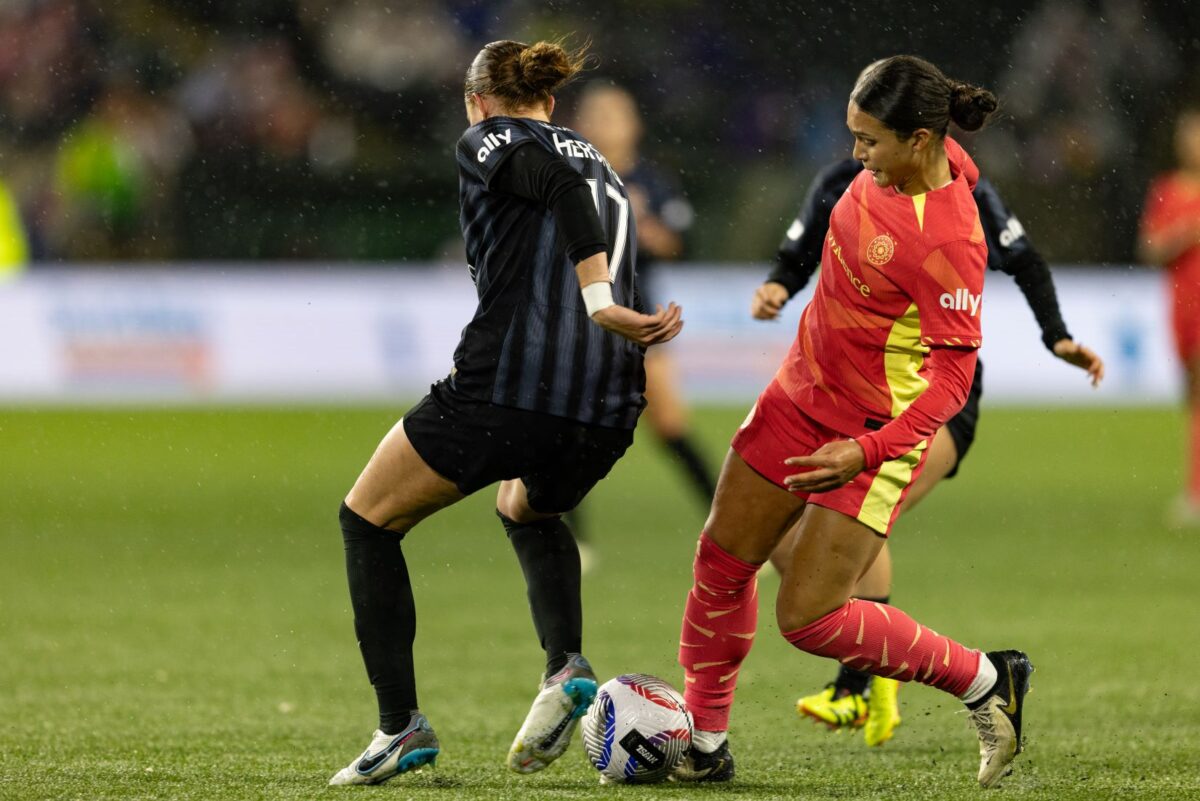
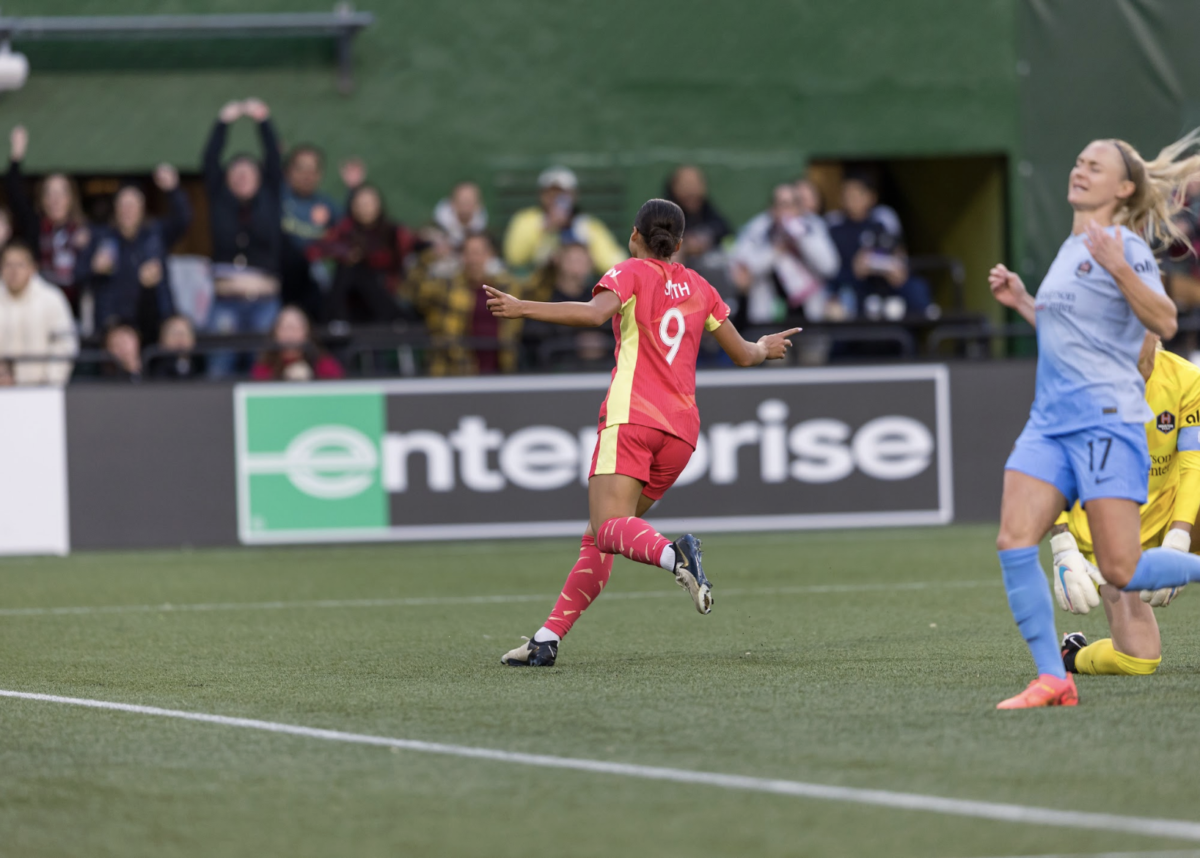
The Portland Thorns’ new Ken-look-alike interim head coach Rob Gale has an undefeated record in the NWSL as Portland (finally) picks up their first home and road wins of the 2024 season. It’s been a slow and bumpy start to the season, and while it’s too early to make any calls on how competent Gale is as a coach, there is officially enough data to try and determine what type of team the Thorns are going to be under his interim tenure.
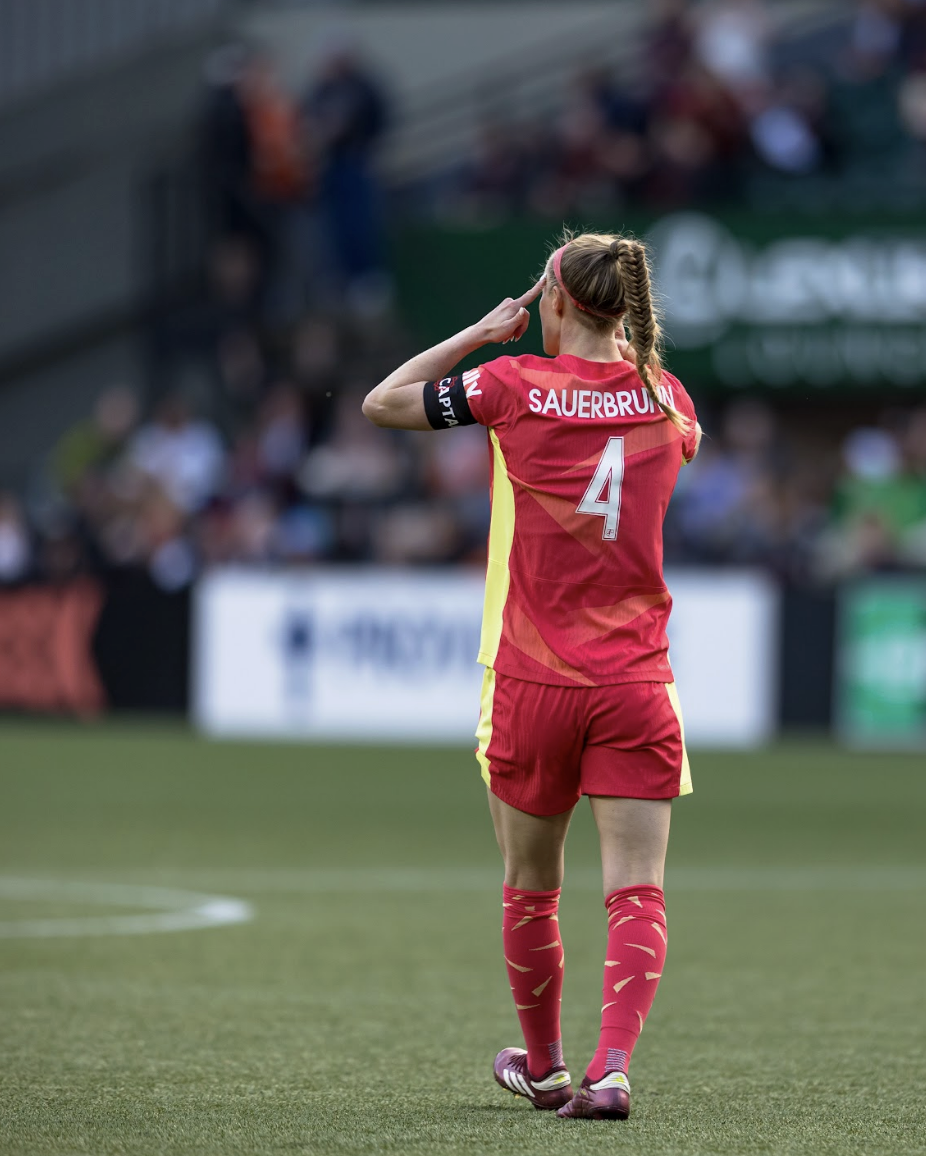
The Thorns conceded within the first 10 minutes of three of their four first games of the season. Luckily—or more likely, intentionally—Portland has flipped the script and were able to score first in the sixth and 10th minute of their last two matches. Postgame against Houston, Sophia Smith credited the fiery start to a change in the team’s warmup, something that ensures the team gets a taste of competition and “that fire in our blood flowing before we step on the field and the kickoff happens.” The new pregame ritual includes competitive games like rondos.
“To win is the expectation,” Smith said. “This is the Thorns that we know.”
Olivia Moultrie said these wins have felt like “the start of a new season for the Thorns,” as they set a new standard for performances going forward.

Gale has not made many changes to the starting XI that the Thorns began the season with, but the two he did make made all the difference. Firstly, Hina Sugita has played 90 minutes in both games, compared to being a second-half sub under former head coach Mike Norris. Hina a versatile player that needs to be on the pitch and can slot in pretty much anywhere in the front six. She played as a box-to-box midfielder in both games, connecting 88% of her passes in those 180 minutes and earning one assist. Gale’s choice to exchange Hina for Moultrie in the starting XI balances out Portland’s midfield; as in the first few games of the year, we saw Moultrie and Jesse Fleming occupying many of the same spots, leaving empty gaps in the midfield for the opposition to play through.
After the Houston game, Gale said the midfield “smothered Houston” due to their pressing, and he was right.
Hina, Sam Coffey, and Fleming started against Chicago as well and worked very well together, combining for nearly 86% passing accuracy going forward. It seems as though the Thorns have found their ideal midfield trio going forward.
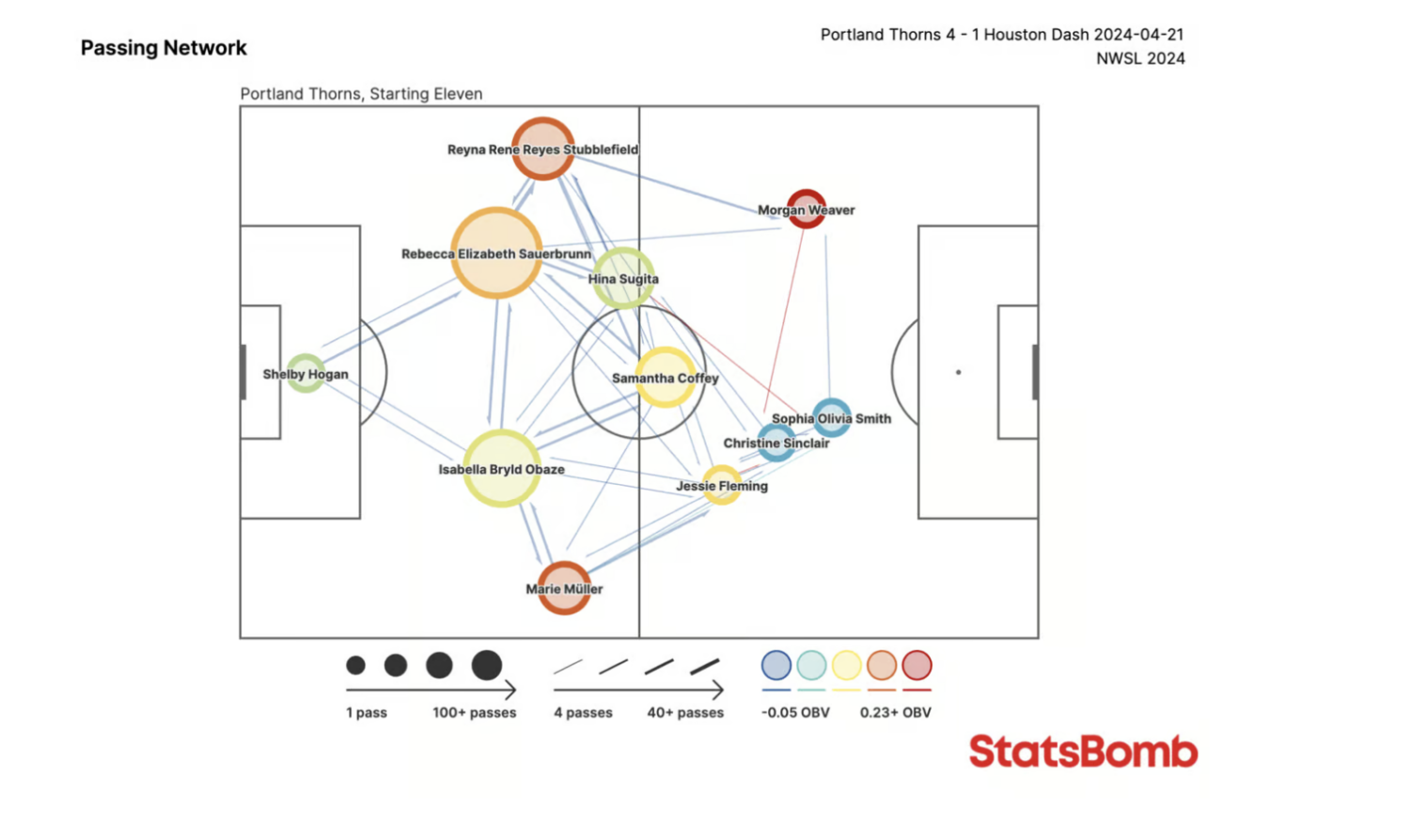
The passing map from the Houston game makes it clear that the Thorns have well-executed passing triangles, which result in quick give-and-goes up the side of the pitch. The front three look a little wonky because Christine Sinclair and Smith frequently switch between center and wide forward, but the triangles are still there.
The Thorns are finally looking like the well-oiled machine that they have been in years past. I would also like to give a special shoutout to Isabella Obaze, who has looked remarkably strong and seasoned beyond her years in recent games, growing tremendously since that first showing in Kansas City.
Gale starting Sinclair up front was a very curious (and unpopular) choice, but it allows Janine Beckie to come off the bench against tired legs, which is where she shines. After an ACL injury and a poor 2022 season, Beckie is still trying to find her footing on an attacking-heavy Thorns roster, especially with Payton Linnehan impressing in her early minutes. Sinclair, interchanging with Smith up top, has really surprised me. In the last two games she has one goal and one assist, showing that she can still be productive. I liked the Thorns using her to set a tempo and mindset early, and I think her presence up top helps ground the team as they work through their early-game jitters. Even if Sinclair’s speed and touch isn’t what it used to be, her mind is definitely still there.
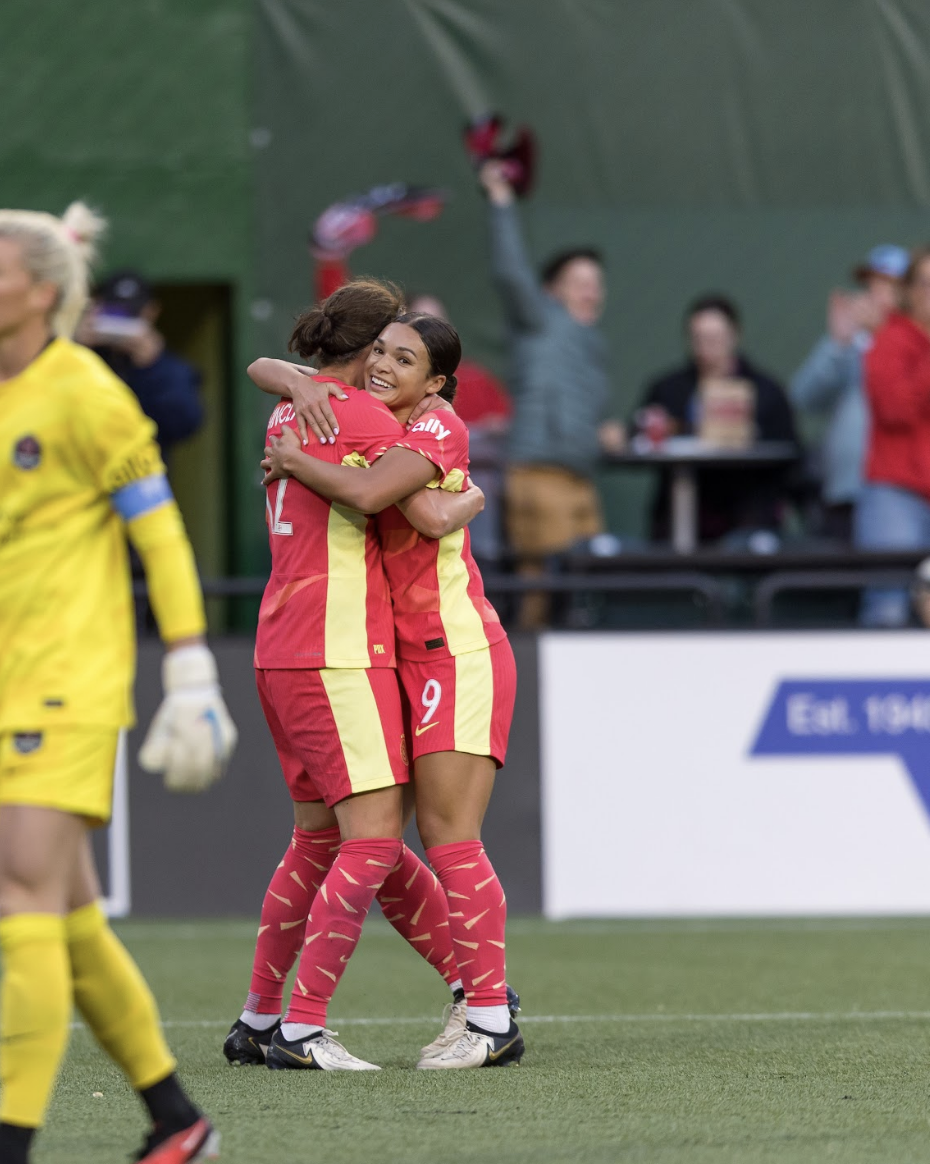
Shelby Hogan posted her first clean sheet of the season on Saturday, making three saves against Chicago. While her decision-making on the line was sharper than in previous games, Hogan’s distribution and ability to build out of the back still remained a major issue for the Thorns, as she gave the ball away in compromising positions numerous times and was bailed out by the woodwork. Prior to the game against Houston, the Thorns signed Mexican international Emily Alvarado from the Dash to provide competition for Hogan for the starting role. It was a move that makes sense at first, but upon closer investigation, leaves a little to be desired. I have been an advocate that, with Bella Bixby out on maternity leave, Portland needs an experienced keeper available for training and games. The Thorns started the season with three keepers who had played in two NWSL regular season games between them, the most inexperienced goalkeeper union in the league.
Here is where the confusion lies: Alvarado also has zero NWSL regular season minutes, having served as Jane Campbell’s backup since Houston acquired her from Stade de Reims in early 2023. While she does have 39 starts in the D1 Arkema, she conceded 66 goals in those games. With the Thorns still working on building chemistry across their back line, bringing in another inexperienced keeper doesn’t make much sense. At this point, why not give Lauren Kozal a try in her second year with the team? Or even Kat Asman, who the Thorns drafted 39th overall and who has been with the team since the beginning of preseason. With a three-game week, I assume that we will see Alvarado in goal against Bay FC on Wednesday, and I am curious to see if her distribution and ability to organize the backline is any stronger than Hogan’s currently is.
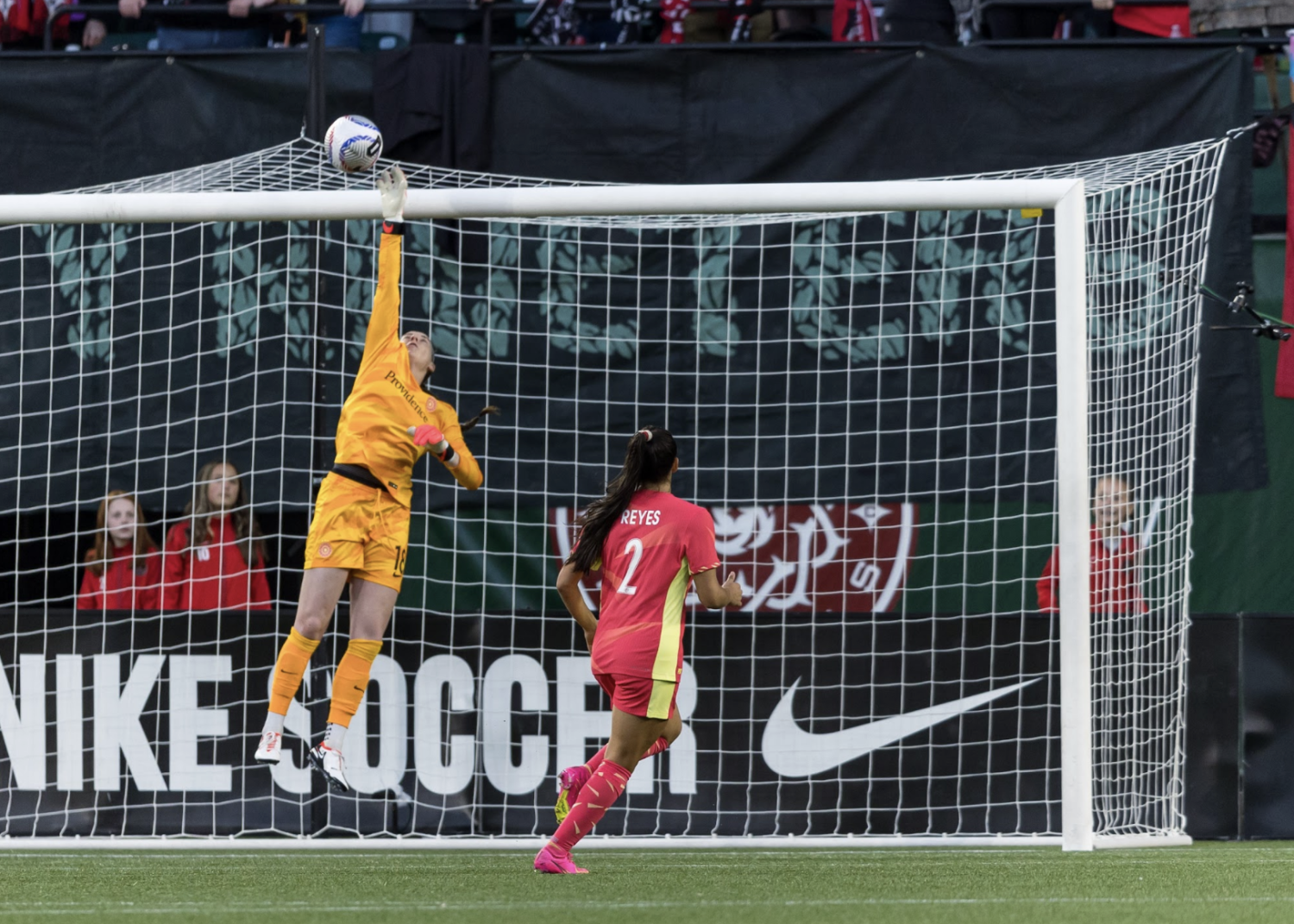
The Thorns’ one and only three-league-game week is this week, with the Bay and the Washington Spirit on deck for Wednesday and Sunday, respectively. It will be Gale’s first real test to see how he manages minutes for players to try to get nine points from the week.
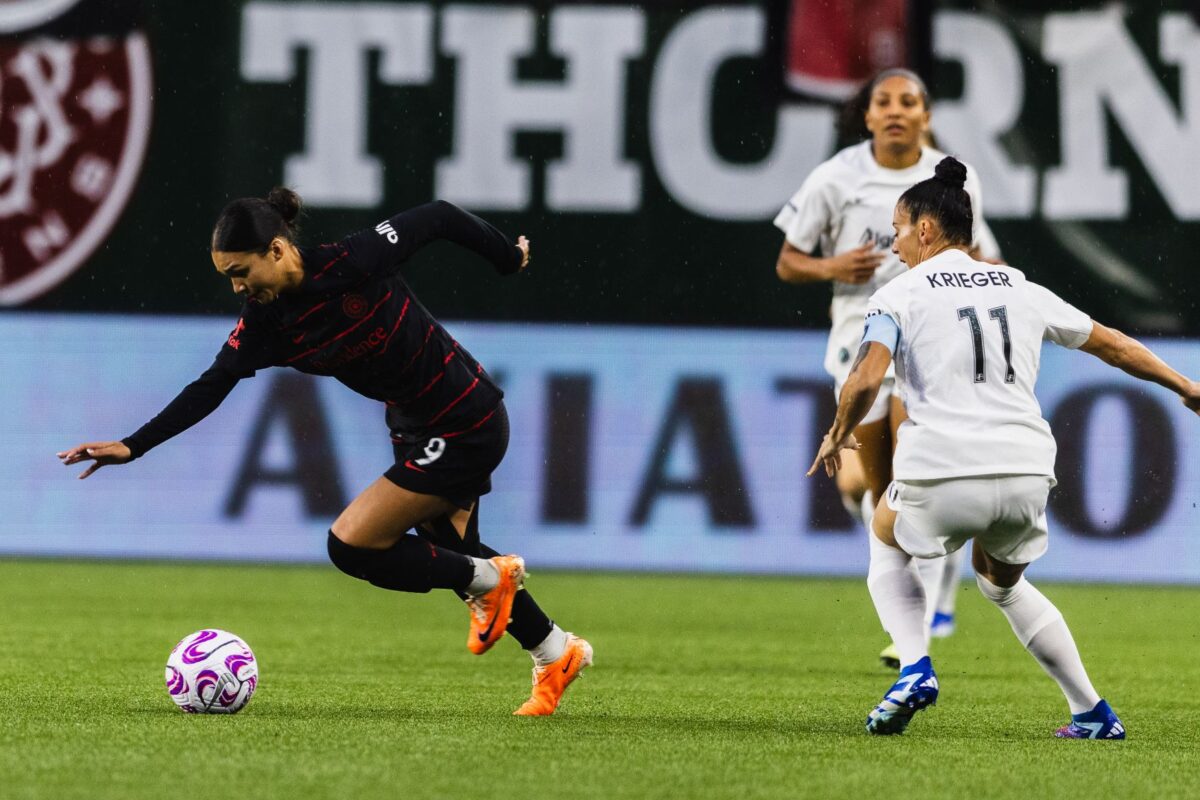
You can’t give me back what you’ve taken
But you can give me something that’s almost as good
—The Mountain Goats “Getting Into Knives”
Despite finishing second overall in a very close NWSL season, the Portland Thorns had been on a downward trajectory since the World Cup in August. Following a 4-2 win at home against Washington Spirit in July, the Thorns went 4-7-2 in all competitions. Most notably for the high-scoring Thorns, however, is that in their last five games (semi-final included), Portland only scored two goals while allowing eight. There are a host of reasons for why the team never seemed to regain composure after the World Cup break, but they boil down to two things: a roster that isn’t as deep as its best 11 players and a complete absence of tactics.
After a brutal 1-5 loss to Angel City—which lost the NWSL shield for Portland—the Thorns had to wait three weeks to play their next game. In that time, Hina Sugita went to Uzbekistan, Natalia Kuikka went to Finland, Cristine Sinclair to Canada, and Olivia Moultrie, Sophia Smith, Becky Sauerbrunn, Sam Coffey, and Crystal Dunn went across the United States. That’s the majority of the Thorns’ starting XI across the entire season gone during the preparation for their single most important game, without considering the extra minutes on legs and time zone changes that went along with international duty. For players like Smith, the break was a chance to build back up game minutes, but for players like Moultrie and Coffey, who either did not see the field or played limited minutes, it was more of an extended training away from the Thorns. That wasn’t ideal for a player as crucial as Coffey for a team that had been leaking goals left and right.
The international break also factored into the XI eleven for the semifinal game against New Jersey/New York Gotham FC. The two outfield changes from the Angel City game were Kuikka and Hina, who were replaced by Reyna Reyes and Rocky Rodríguez, respectively. Hina has probably been the Thorns’ most consistent player all season behind Sam Coffey, and being able to bring her off the bench is an asset; perhaps if she had started the game as she had the last time the Thorns faced Gotham, the game could have been wrapped up in 90 minutes. Reyes, on the other hand, played her way into the starting XI—and deservedly so—but perhaps starting Kuikka and Reyes against the fast front line of Gotham would have been more effective.
The biggest change of the night, however, was Shelby Hogan’s selection over Bella Bixby. In probably the boldest move of his tenure, head coach Mike Norris gave Hogan her second regular season start in the team’s biggest game. He said postgame that the change was performance-based, which is a valid assessment of Bixby’s recent form. As much as I love and appreciate Bella Bixby’s personality and vulnerability as a player, I think getting benched in such a crucial moment is what she needs in order to reset herself. None of that takes away the fact that Hogan is an excellent keeper, the lone goal she let in was borderline-unstoppable for any keeper, and she is capable of being a first-choice keeper. Hogan ended the night with two saves, but she was not very busy over the course of the 120 minutes.
Statistically, the game was a stalemate. The Thorns ended with 0.62 xG and 11 total shots to Gotham’s 0.50 xG and 13 total shots. Gotham had 20 fouls (four yellow cards) while the Thorns had 18 (one yellow). Both teams had four corners. On paper, there was little separation between the two sides. The game was won and lost on the sidelines, with coaching, and with the bench.
Over the course of those 120 minutes, Norris only made two impactful subs: Hina and Kuikka at the 60th minute for Rodríguez and Meghan Klingenberg. Smith, whose longest stretch of minutes since she got injured in August was 45 minutes for the USWNT, played the entire game, despite looking visibly fatigued and not as effective as she could have been. Morgan Weaver, who had tape around her left knee, also looked as though she was nursing an injury, as her speed, finesse, and power were absent along the left flank. Dunn has been dealing with an ankle injury for many weeks now, as well.
The Thorns are consistently talked about as having one of the deepest rosters in the NWSL, but a more accurate statement is that their best 11 players are among the best in the league, if not world. The drop off in quality once these eleven are subbed off or injured is quite noticeable. For example, in the 116’ Hannah Betfort, Christine Sinclair, and Michele Vasconcelos came on for Weaver, Moultrie, and Dunn. Sinclair aside, Vasconcelos and Betfort have seen sporadic minutes over the course of the season to varying levels of productivity. While they are decent players—and could really shine at a mid-table team—there is a vast canyon between them and Weaver and Smith, who they typically come on for. By not having any serious game changers available off the bench, Norris had his hands tied when his game plan was not working and he had no good options to try something new.
While it is important that the core of the championship winning team (i.e. the same players that both former head coach Rhian Wilkinson and Norris used in their XIs) came back for the 2023 season, there was no recruitment outside of the college draft to try and bolster the depth of the team and challenge these top players for starting spots. Once Janine Beckie, one of the better additions over the past two years, went down with an ACL tear in preseason and no signing was made to replace her, the writing was on the wall that there was going to be little to no investment into the team this year. Reyes is probably the best addition to the team, as seen by her nod on Sunday. But other than her, the new recruits hardly featured. Izzy D’Aquilla got minutes at the beginning of the season, but her time waned significantly as it became clear she was having a hard time adjusting to NWSL play from college. Adriana Leon, a weird fluke of a loan most likely to help her build minutes for Canada before the World Cup, barely saw the field, and Rikke Seveke has not made a gameday roster since her signing. It’s hard to attract top talent to Portland when an impending sale has been looming over the club for nearly a year, the team is led by an inexperienced head coach, and the squad plays and practices solely on turf. Ultimately, the lack of competition for roster spots among players cost the Thorns the chance to challenge for the title again, because there was no adequate depth when players went down with injury or hit a run of bad form.
It’s anyone’s guess as to when the Instagram post goes up saying that the Thorns wish Norris all the best and “thank him for his contributions as head coach,” but it is inevitable. From his announcement, where everyone was “Excited to get the season started 🙂 #RoseEmoji,” it was clear that the organization was in a holding pattern for the 2023 season. Postgame, Sauerbrunn said that the sale was expected to clear by the end of the year, and until that time, there probably won’t be anymore movement within the squad. However, waiting for the sale to be officially processed and to hire a new head coach leaves very little time to talk to free agents and prospective international players and convince them to join the new and improved Thorns. Until that happens, Portland is not going to be seen as a top soccer destination, which will seriously threaten their chances of building the squad depth that they need to win consistently next season.
I feel as though every week I talk about Norris’ lack of tactics, so I won’t bear repeating myself again. For a first-time head coach, he relied on his star players, and for the most part that worked out well for him. I think with more experience, he could be decent. But the Thorns aren’t the team to learn to be great with; you already need to be great in order to get the job. I can only ask that the next head coach is able to actively switch tactics and game plans when something isn’t working instead of continuing to force a square peg into a round hole.
It’s been a frustrating year to cover the Thorns, not due in any part to the players on the team. It’s been frustrating to see the players in press conferences take responsibility for bad tactics and leadership when in reality they’ve had little guidance. It’s been frustrating to watch the investment, marketing, and adequate training grounds flatline for a team that has set standards in the NWSL since 2013. And, of course, it’s been frustrating to watch Sam Coffey sit on the sidelines of so many USWNT games. I can only hope that this holding pattern that the team has been in since 2021 is over soon, that they can get an owner who puts their money where their mouth is, invests in the team, and attracts top players and coaches from across the world. Women’s soccer is exploding globally, and I fear that this offseason is crucial to make sure that the Thorns don’t fall behind even further.
But, it’s also been a great year to cover the Thorns. Hannah Betfort had a breakout year, Reyna Reyes showed that she’s the future of the Thorns’ defense, Sophia Smith remained in God Mode, and Sam Coffey is such an incredible leader. Whatever happens over the offseason, the players that composed the roster these past two years are special.
“The people in this locker room will never be the same after this year,” Sauerbrunn said postgame, “and we need to appreciate every single moment that we have together.” I think she’s right, and I hope that we have shown that we do appreciate the players, even when their organization repeatedly lets them down.
There’s gonna come a day when you’ll feel better
You’ll rise up free and easy on that day
And float from branch to branch, lighter than the air
Just when that day is coming, who can say? Who can say?
— The Mountain Goats “Up The Wolves”
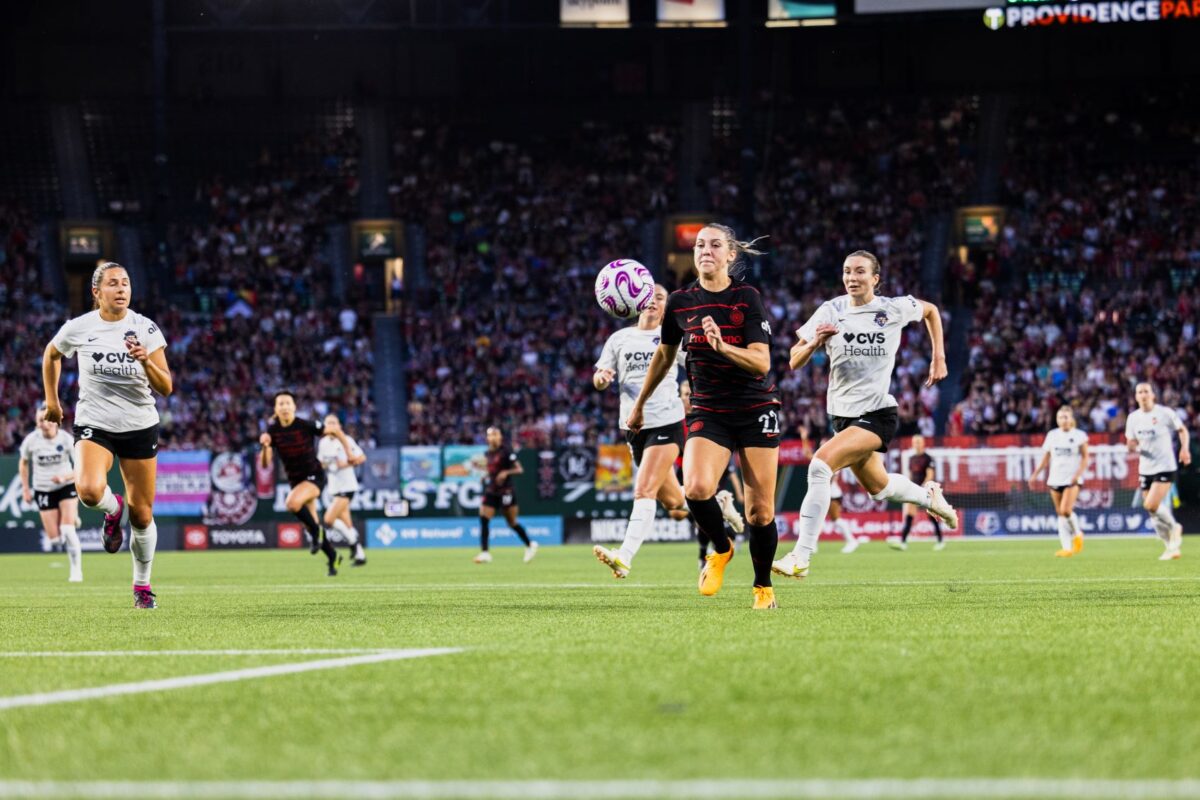
The Portland Thorns played their first game with all five World Cup players back in the squad last weekend against the Washington Spirit in DC. The team was coming off of a much-needed victory where the team set the record as the first NWSL team to receive a first-half red card (awarded to Kelli Hubly) and win the game. Better yet, that game resulted in the Thorns taking three points off the North Carolina Courage, which was probably the biggest win of a game that included some insane ball control from Hannah Betfort for the equalizer and a Sophia Smith game-winner less than a minute into her return to Providence Park.
With momentum on their side, the Thorns travelled to DC to take on Mark Parsons’ title-contending Spirit. More so than most teams in the league, both the Spirit and the Thorns had players that suffered significant World Cup roster-related injustices. Sam Coffey and Ashley Hatch were inexplicable snubs, Crystal Dunn had to play in a non-natural position, Sophia Smith and Trinity Rodman were wingers in a system that isolated them and didn’t let them perform to the best of their abilities— the list goes on. With squads filled with players who were looking to prove their talents after a lackluster USWNT performance, tensions were always going to be high, and the match was set to be cagey.
Ultimately, a 1-1 draw was not what the Thorns wanted after dominating 4-2 in the earlier matchup, and the game was less tactically promising than it could have been. Let’s look at why, and how it may affect the Thorns as they head into the final stretch of the season.
The Thorns debuted their new 4-4-2 formation against the Courage and brought it out again in DC. As someone who has advocated for more defensive coverage with such advanced wingbacks all season, I am delighted at the success of a Rocky Rodríguez-Coffey double pivot. It provides much-needed stability for Portland’s backline, which was especially necessary with the Meaghan Nally-Emily Menges backline that Portland started due to Hubly’s red card. The Thorns held the Spirit to 0.62 xG, not including the penalty—very low for a team that has the attacking powers of Rodman, Ashley Sanchez, and Ashley Hatch.
While the new formation allows the Thorns to more effectively carry the ball through the middle of the pitch and have adequate defensive coverage, there was a disconnect between the eight midfielders and defenders and the two forwards. The Thorns only had 10 total shots, four of which were on goal, a shockingly low number for the team who has scored an average of 2.3 goals per game this season. The Thorns also only had 78 passes within the final third for a 53% passing accuracy, matching the eye test that showed the midfielders unable to find the feet of Smith and Morgan Weaver. In fact, the players with the highest number of completed passes throughout the game were the four defenders and Coffey. While it is important to be able to maintain possession in your own half, you need to be able to progress the ball up the field in order to win a game. The Thorns were unable to consistently do that against the Spirit.
The new formation seems to have been created around Smith and Morgan Weaver, who have great chemistry and the ability to change sides and seamlessly float in behind the back line. However, when Smith went down with what we now know is a mild MCL sprain in the end of the first half and the scoreline was still 0-0, the pressure was on for head coach Mike Norris to make some kind of formation or tactical change in order to grind out the win.
Betfort has been coming in for Smith all season and started in Smith’s absence at the World Cup. However, Betfort’s playing style is immensely different to that of Smith’s. Honestly, there is no player in the world who plays at Smith’s level, and it is unfair of Norris to slot Betfort into Smith’s position and ask her to do the same things, like receiving the ball with her back to goal and dribbling through multiple defenders to get a shot off.
Betfort is an out-and-out No. 9. Her ball control has improved immensely over the course of the season, as has her shot selection. However, she does not have the same dribbling control that Smith has (to be fair, no other player in the world does). A 4-3-3 is much better suited to Betfort’s strengths, where she can receive the ball in the box and use her physical strength to shoot it on target. A 4-4-2 where Betfort is up front with Morgan leaves less room for her to get good services into the box, and it’s not fair to expect Betfort to produce in a way that is not playing to her strengths.
Additionally, Weaver traditionally has done very well at tight angles, when she is able to cut in from the left side as opposed to starting centrally. Transitioning back to a 4-3-3, where she and Hina Sugita play out wide up top, will allow both players to cut in and threaten goal—a tactic that has historically worked well for both players.
The Thorns only had seven crosses throughout the entire game, compared to Washington’s 14. I would argue that the Thorns’ only good chance of the night came on Weaver’s goal, and in large part was due to Coffey’s excellent weighted ball behind the backline. Betfort, who played over 45 minutes, only had 17 touches on the ball, meaning that she was essentially boxed out of the game—largely was due to the formation. Reyna Reyes, who played only 15 minutes, had more touches than Betfort. In Smith’s absence the Thorns need to go back to a formation that allows their available forwards to succeed.
Despite failing to block Hatch’s penalty kick in stoppage time, Bella Bixby had a very good game. She had four saves on the night, but her real strength during the game was organizing the defense and being aggressive in the box. This season Bixby has become more aggressive off her line, stepping out to get crosses and long balls to mitigate shots before they even happen. A lot of the play in the NWSL is direct and over-the-top, inviting players to go one-on-one with the keeper. By coming off her line early, Bixby forced the Spirit front line to try a different route to goal, which they struggled with. Meghan Klingenberg and Natalia Kuikka were largely able to shut down Washington’s forwards’ attempts at running down the wings, and if they were able to get a cross off, Bixby was quick to track it down instead of waiting for the second ball.
These abilities are ones that should be valued by the USWNT, so hopefully Bixby gets called into an upcoming camp, as her play this season deserves recognition.
Honestly, I think Hina was the player I missed most during the World Cup break. Her work rate and ability to stick with the ball is unmatched. I don’t know how she manages to win some of the tackles she does, and her trickery on the ball is so much fun to watch. With Smith likely out until at least the playoff run, I would argue that Hina will be the Thorns’ most important player during the next stretch of games. They will need to utilize her strengths to float around the pitch wherever she pleases. Hina Hive let’s get loud!!
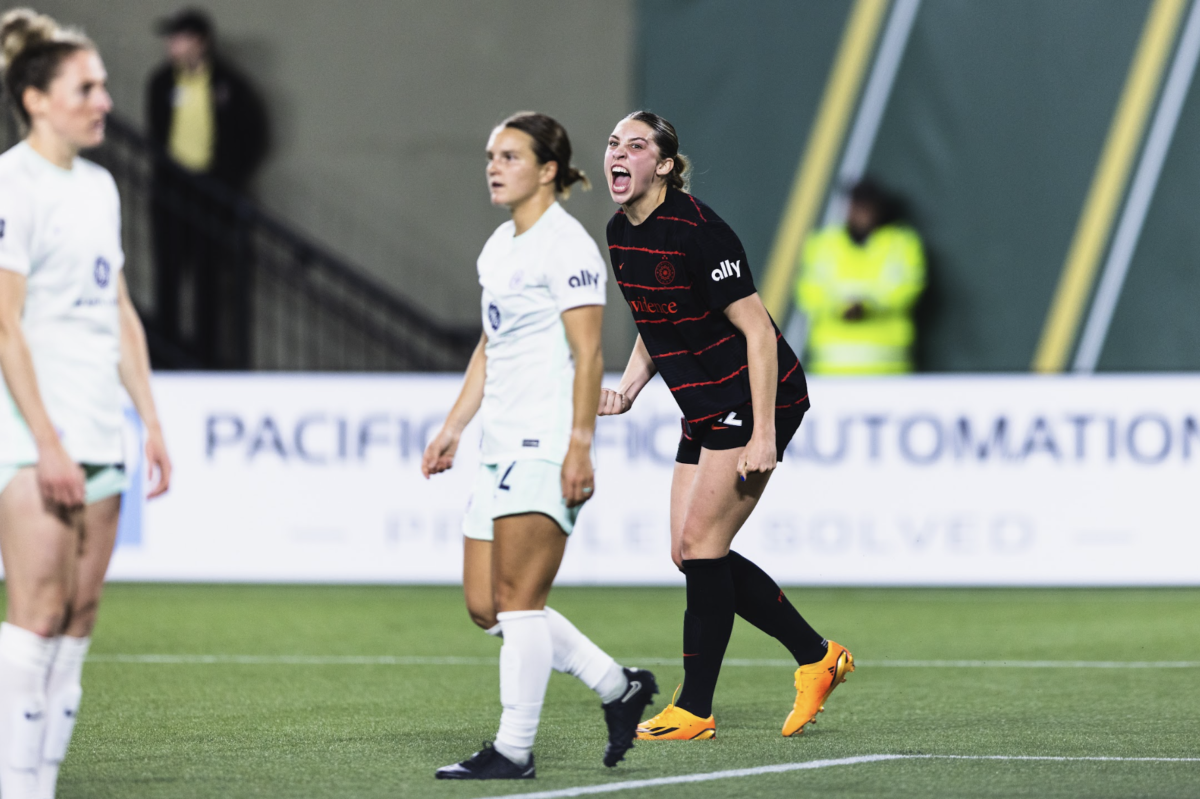
The Portland Thorns claimed sole possession of the top of the NWSL table with their 2-0 win over Racing Louisville on Saturday evening. All time against Louisville the Thorns are 5-0-0, scoring 12 goals and conceding just one. While the scoreline may suggest a dominant performance over Louisville, the game itself left fans nervous that the Thorns would concede a goal late—not closing out the game with the professionalism and deftness the team normally shows.
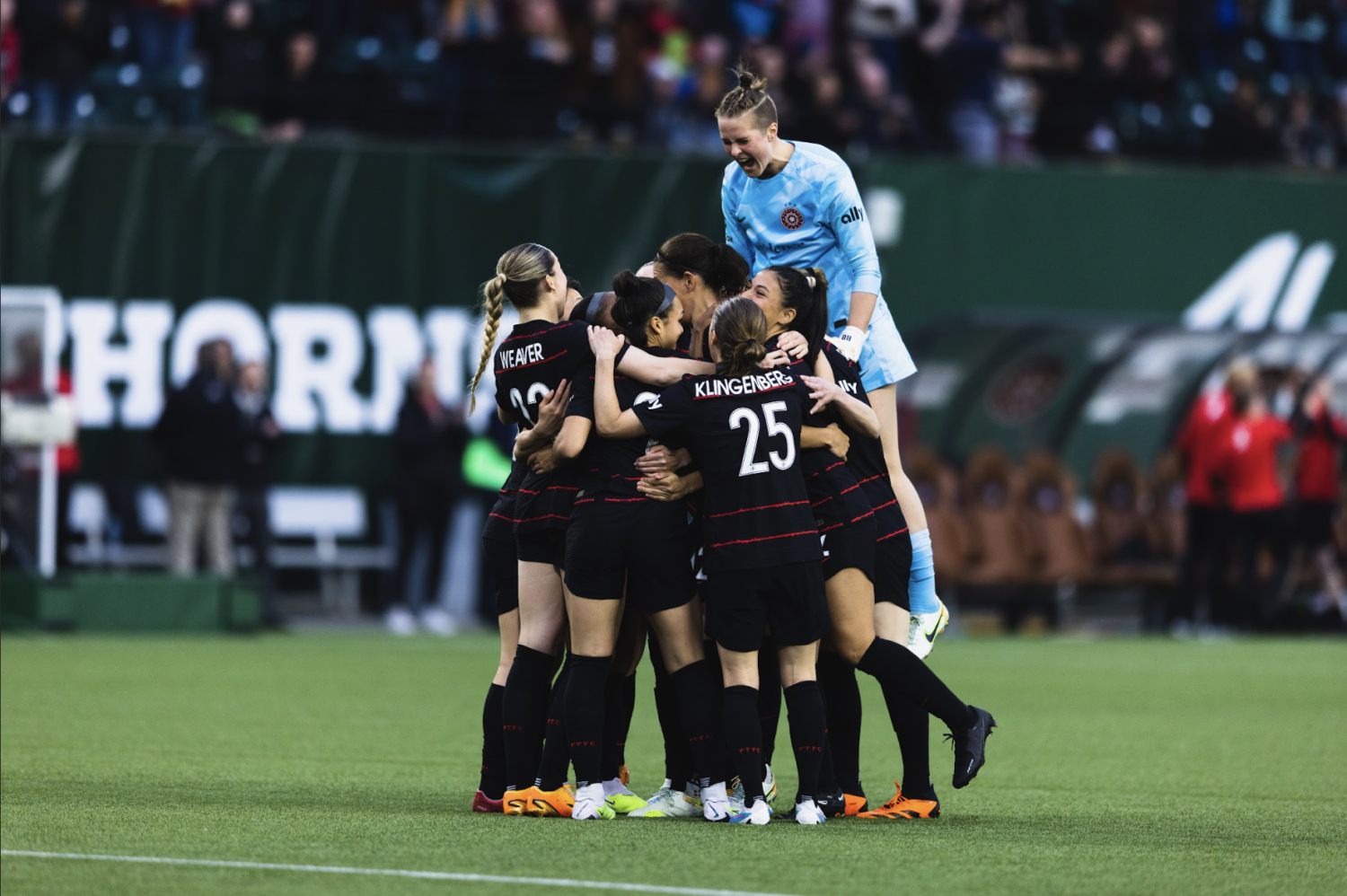
The largest reason the Thorns nearly threatened their dominant 2-0 first half lead was due to the sheer number of minutes that this roster has played recently. Portland was coming off of a stretch of three games in eight days that fell right on the end of an international break. Natalia Kuikka, Christine Sinclair, Adriana Leon, Hina Sugita, and Rocky Rodríguez played international matches in Europe, while Crystal Dunn, Becky Sauerbrunn, and Sophia Smith played in the United States.
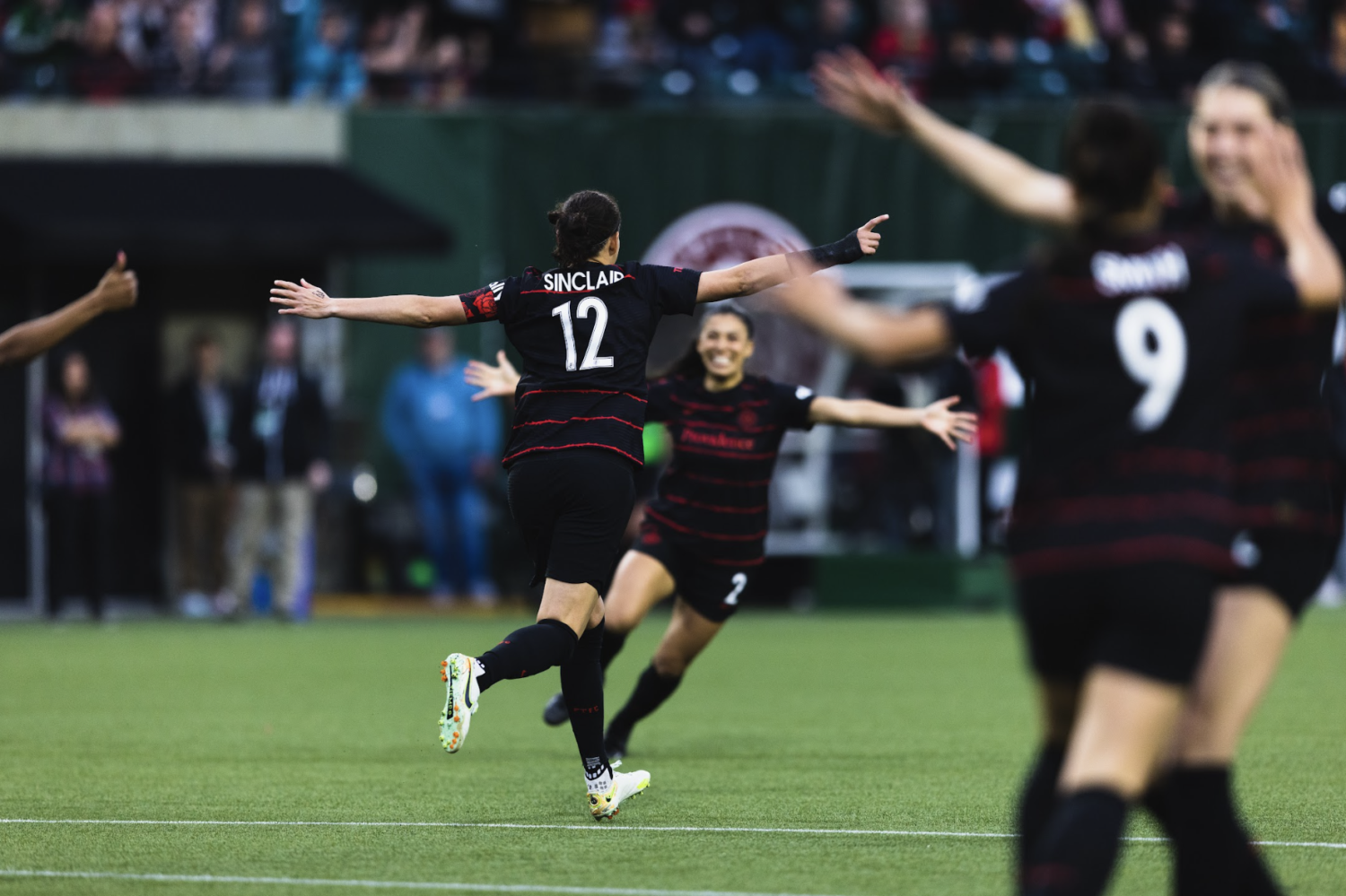
Here are the minutes that each player played for their country during the week of April 6:
Kuikka: 180’ vs Slovakia
Sugita: 77’ vs. Portugal, 3’ vs Denmark
Rodríguez: 90’ vs Poland, 90’ vs Scotland
Sinclair: 63’ vs France
Leon: 76’ vs France
Dunn: 67’ vs Ireland
Smith: 135’ vs Ireland
Sauerbrunn: 120’ vs Ireland
Six of these eight players already seemed to be heavily favored in head coach Mike Norris’ preferred starting lineup (Leon, the new arrival, and Rodríguez, who consistently comes in around the 60’ mark in the midfield notwithstanding).
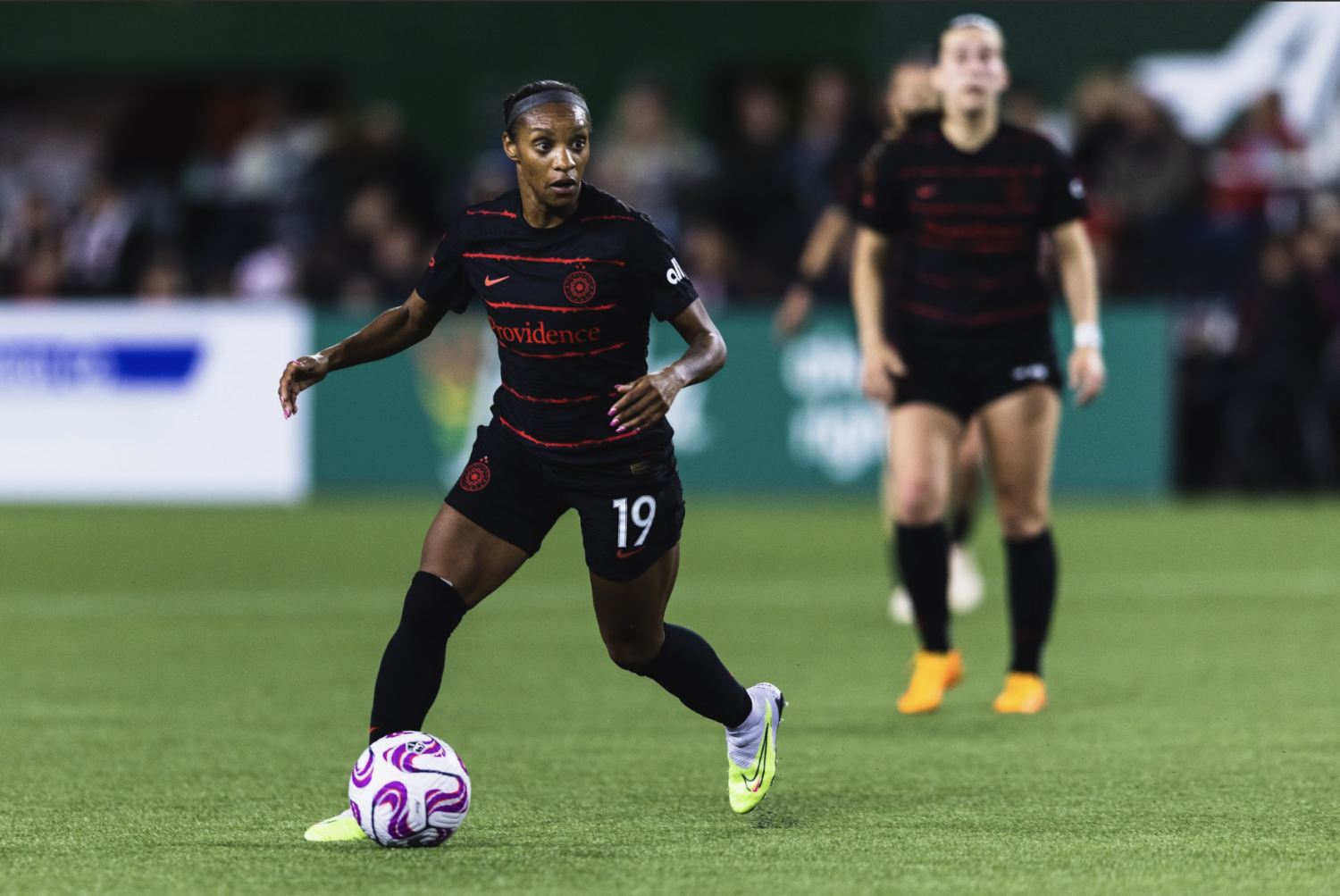
Norris’ starting XI against Houston on April 14 featured nine of 11 players that started against Louisville on April 22. This would not be much of a concern, if five of the players did not also start against San Diego midweek.
Here are the minutes that the starting XI against Lousiville played during the three game stretch:
Bella Bixby: 180’
Meaghan Klingenberg: 180’
Becky Sauerbrunn: 148’
Kelli Hubly: 270’
Reyna Reyes: 158’
Sam Coffey: 180’
Crystal Dunn: 137’
Morgan Weaver: 202’
Christine Sinclair: 158’
Hina Sugita: 174’
Sophia Smith: 197’
Compounded with the minutes that these core players played during the international break, many were averaging over 300 minutes in a two-week time span.
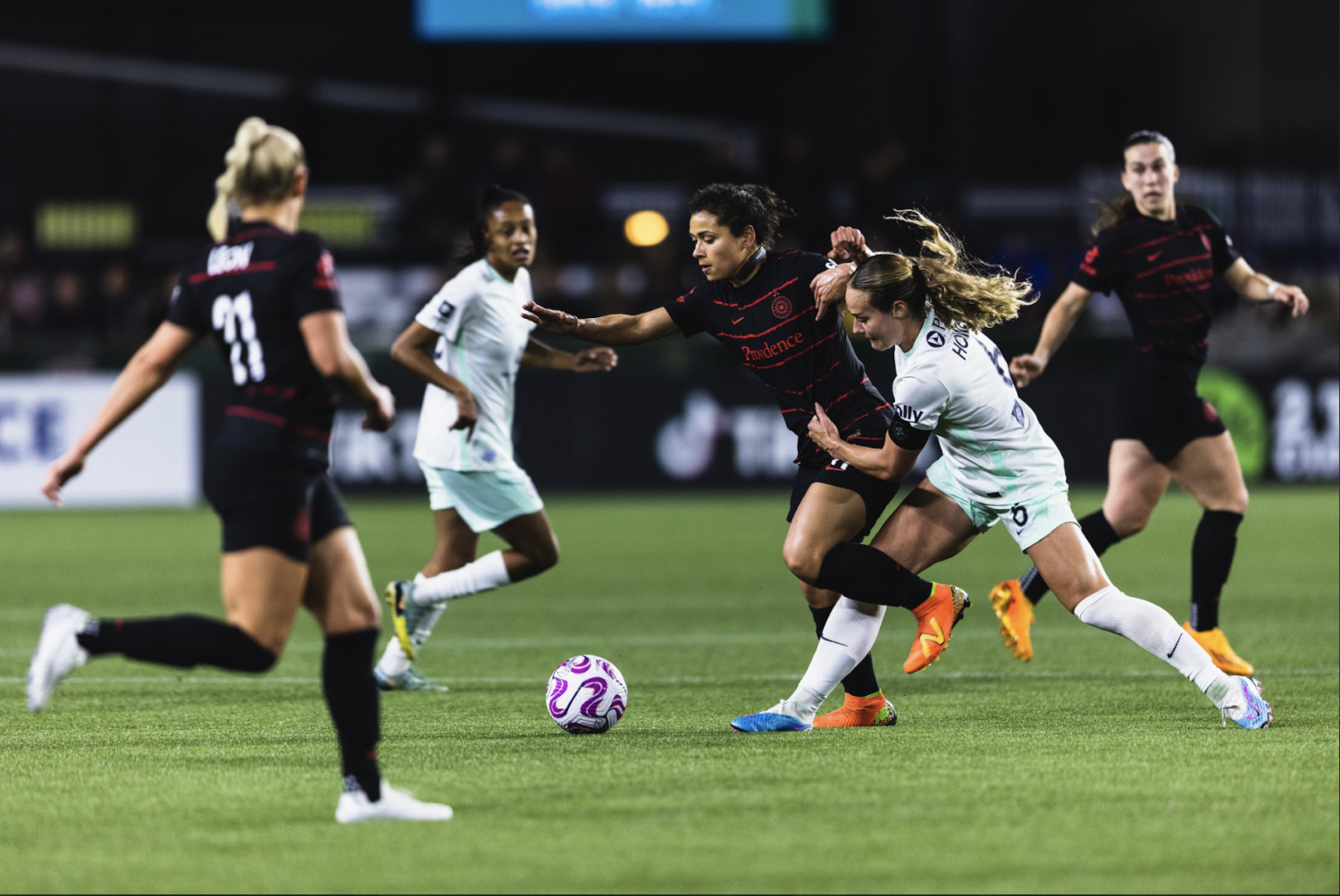
I bring all this up because the Thorns lost the game against Louisville in a clinical sense. Racing did not play a midweek game, and many of their players did not get minutes internationally during the break either. The miles on players legs showed from the initial whistle, and it was both mental and physical fatigue that prevented the Thorns from closing out the game in a clinical sense. Every touch seemed a little heavy, and their passes seemed inches off or hit too hard, allowing Racing’s players to read and intercept them. Despite outshooting Racing 20-12, the Thorns did not outplay Louisville by any means.
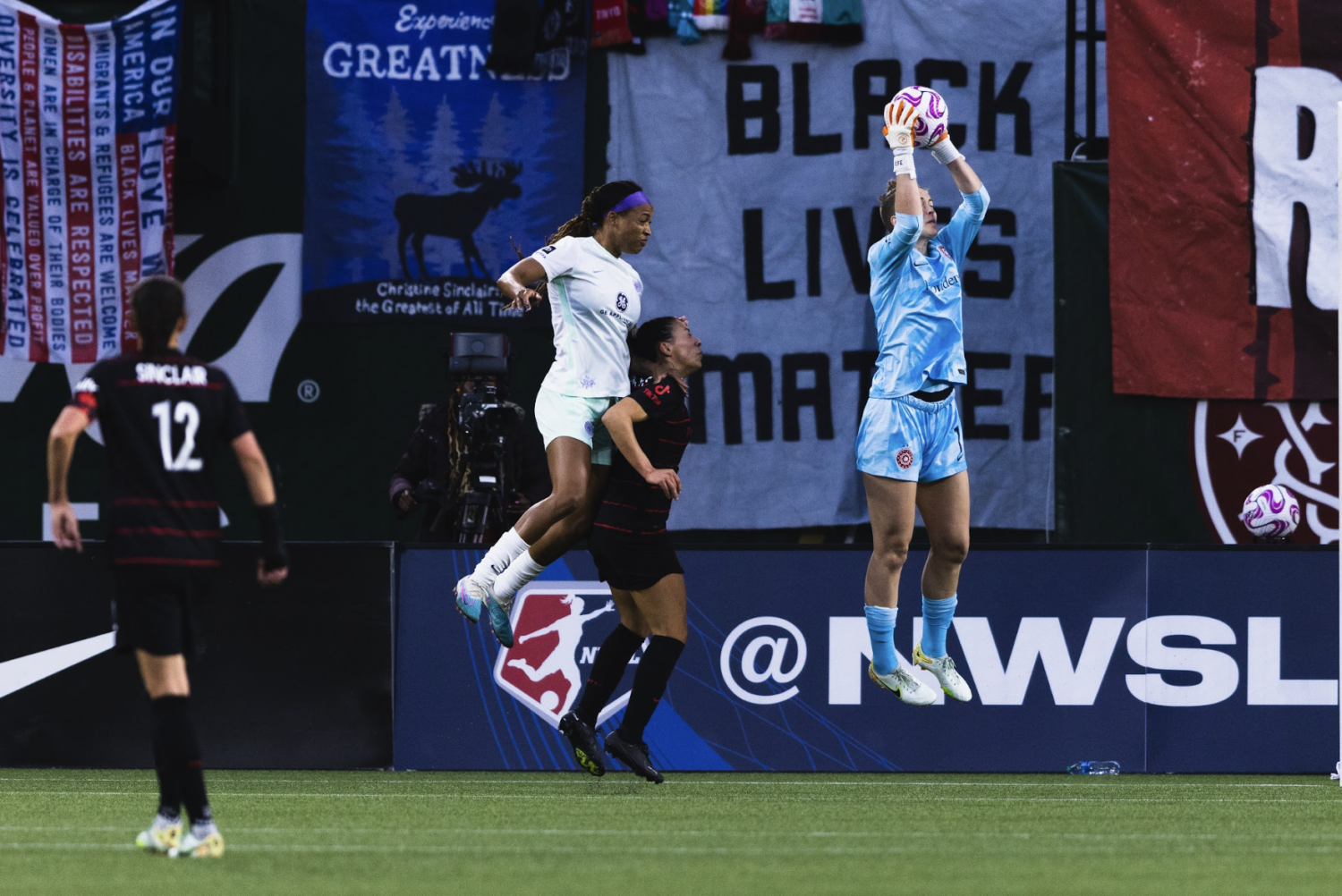
While, like Norris commented on postgame, the Thorns “did not have a complete performance [and] were just a bit off in moments,” they still were able to persevere and that is a testament to the professionalism of the individual players.
However, across the highest levels of professional women’s soccer, it seems as though long term ACL, hamstring, and calf injuries are plaguing players. The schedule of women’s players have increased to match men’s sides with the introduction of things like midweek Challenge Cup games, but funding and research toward preventative care and the anatomical differences between different genders has not kept pace. The Thorns have already lost one player to a season-ending ACL injury and have yet to name a new head trainer after the firing of Pierre Soubrier. All the positive culture and fun that the Thorns have at trainings and games cannot combat the “big ask coming back from Wednesday, travel Thursday, manage players [Friday] and then put a performance in [Saturday] to get the three points,” in the words of Norris.
While the players, except Sauerbrunn, who went off around the 60th minute with an ankle injury that was being monitored all week, seemed to have made it through the three game stretch unscathed, a game against Louisville, a team the Thorns have a comprehensive history of victory against, would have been a good chance to give some of the players who typically come off the bench an opportunity to get regular season minutes.
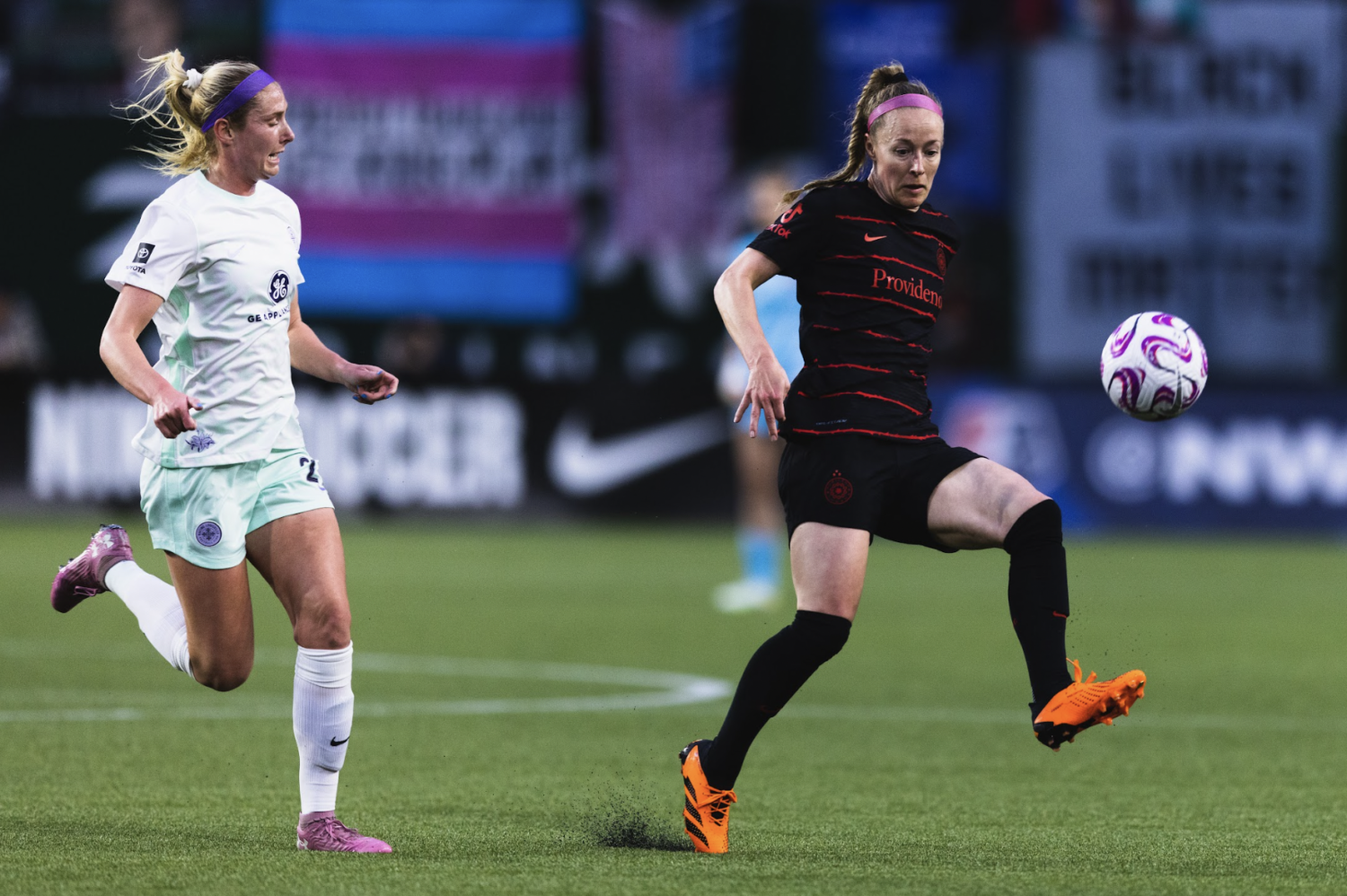
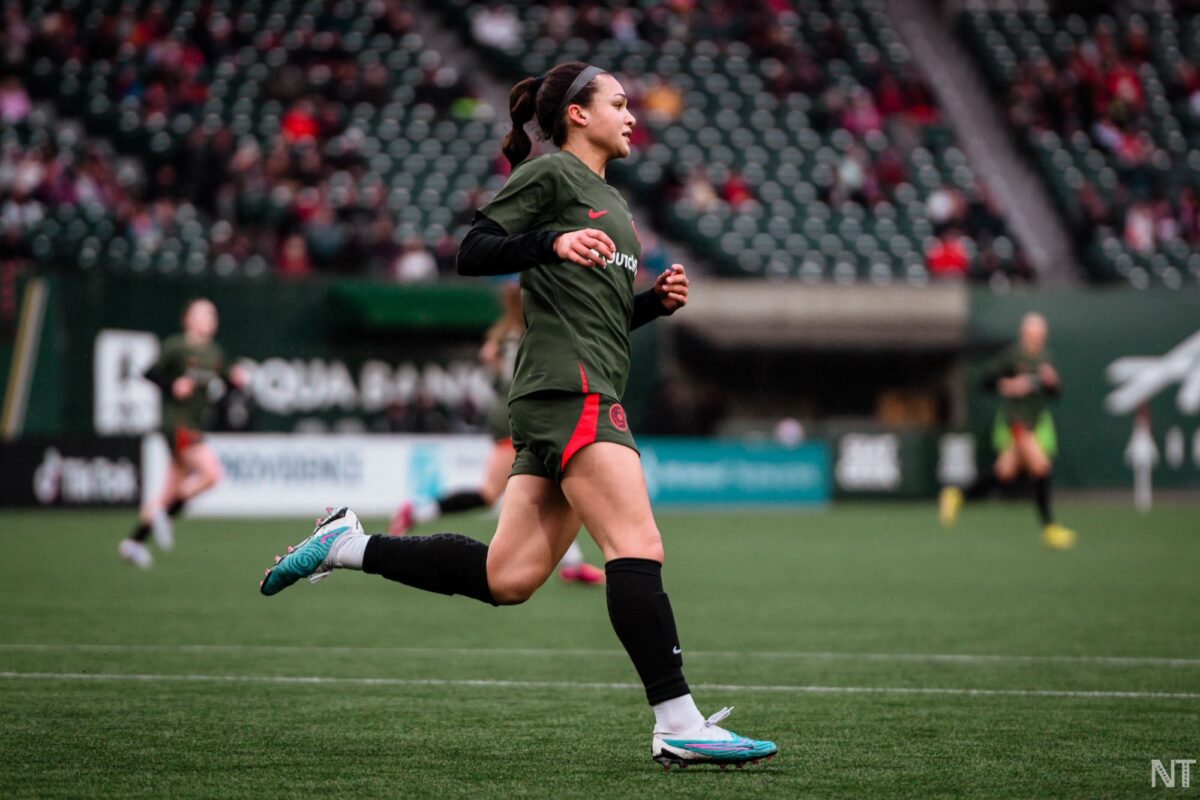
It isn’t easy to follow up a 4-0 season-opening home victory, but the Portland Thorns did just that Saturday in Kansas City. Portland’s 4-1 win over last year’s NWSL Championship runners-up—featuring a dominant first half and a Sophia Smith hat trick—positions them at the top of the NWSL table, tied on points with the San Diego Wave.
Despite soccer being a game of two halves, the match was something of a three-act performance: the opening 45 minutes where the Thorns dominated, Kansas City threatening and scoring early in the second half, and Smith doing Sophia Smith things in the last 10 minutes to dam the Current’s attempted comeback.
Here’s a takeaway from each of those.
As Jaiden wrote in their takeaways last week, the Thorns have started their 2023 season where they left off last year. Which is to say they’re still absolutely stacked with talented players who are used to playing together and won the NWSL Championship in 2022. And the Thorns have someone who was missing for much of their 2022 campaign: USWNT star, 2019 World Cup champion, and 2015 NWSL MVP Crystal Dunn.
It was Dunn who opened the scoring for Portland on Saturday, when Sam Coffey found her near post on a short corner kick and Dunn had time to control the ball, look up, and slot her shot past AD Franch.
The third-minute goal set the tone for Portland—and for Dunn’s performance, specifically—that first half.
“She was everywhere,” Smith said after the game, “defensively, offensively, spinning people.”
For Dunn, it was exactly the game she was looking for. “I literally love playing in the midfield,” she said. “It’s honestly where I feel like I’m most authentic to who I am as a player. When I’m able to connect with the forwards to be able to put them in the best position to succeed, it fills me with so much joy.”
And find her teammates she did. Dunn completed an impressive 92.3% of her passes against the Current—far ahead of anyone else on the team.
“She was doing it all,” Smith said. “It’s so much fun to play with her because you trust and you know that she’s going to be right there with you when you go to press and she’s going to be right there with you when you’re attacking.”
But Dunn wasn’t alone in her standout first half. “What I felt all of the first half was just us connecting and people making the right passes making the right decisions,” she said. “Even if it didn’t work out, it was collectively just getting back on the same page and working hard to win the ball back.”
The thing is, we’ve seen the Thorns look really, really good this season, but we’ve seen them look really, really good against teams that are not at their best. The Orlando Pride were… not great when Portland beat them in their season opener, and Kansas City could almost field an entire star-studded XI from their injury report on Saturday.
That’s not to say that rookie Gabrielle Robinson didn’t make a few key blocks on Smith in the first half or that Franch’s positioning didn’t stifle a couple promising looks from the Thorns, but the Current’s defense was a very scrapped-together-last-minute kind of deal.
But something clearly happened during Kansas City’s halftime because they came out of the locker room ready to fight. After conceding all of one shot in the first half, the Thorns were caught on the back foot in the second, stuck defending as the Current forced one turnover and resulting chance after another.
“They fixed some things,” Portland head coach Mike Norris said. “They came up with a different energy, which we didn’t match. We had to ride that storm.” And though they did ride it, the Thorns didn’t come out unscathed; they conceded their first goal of the season to an unmarked Cece Kizer header in the 58th minute.
“I think how the team responds says a lot more about us riding the wave of momentum,” Dunn said. “We were able to get back into it, keep our heads high, staying together, everyone was positive. I think that’s really what this team is about—just being able to solve problems and do it in a way that’s positive and encouraging for everybody to kind of get on the same page.”
Although the Thorns were able to claw their way back into the game, the early second half is a good reminder that scoring four goals every match is probably not a sustainable practice, especially this season.
Maybe it’s just me still having flashbacks to 2019—does that one Courage game still haunt anyone else?—but there is a pretty large part of me that cares less about winning games 4-0 and more about Seeing That Mike Norris is Preparing for a World Cup Year.
“The key is for us to be consistent,” Norris said of upcoming international player absences, “just in terms of the environment that we create every day. The expectations that we have of the players is a big piece, regardless of who’s in or who’s not.”
All this is to say that the Thorns are really good right now, and it’s probably safe to assume that will hold true in the near future. But Portland hasn’t really played against another full-strength squad yet, and this is a year where we’ll have players in and out of the team more so than usual, and this is Norris’ first season as a head coach in this league. I’m not ready to make judgements about what we’ve seen so far means for the rest of the season yet. Still, I’m excited to watch what we have going in the meantime.
As mentioned above, the Current came out of the gates swinging in the second half, and it was the first time this year—in the admittedly small sample size of two games—we’ve seen the Thorns stuck trying to simply keep their opponents from scoring. The important part here is that KC cut Portland’s lead in half, and the Thorns needed something to turn the momentum back in their favor.
That something—or, rather, someone—was, unsurprisingly, Smith, who’d already put away a Portland penalty in the first half. In the 83rd minute, Smith scored her first goal in the run of play, taking on four Current players on the dribble before sneaking a shot past Franch.
“Soph is just out there doing Soph things,” Dunn said in the postgame press conference. “I expect nothing less.”
Soph continued to do Soph things in the 88th minute, finding space at the top of the box and sending a low ball into the back of the net. “I was so shocked that I had more than two seconds to think about what I was going to do,” she said. “That was definitely new to me.”
Mostly I am still obsessed with the KC photoshop here, although I do think there should be three Smiths.
can’t spell sleeve without the L #BAONPDX https://t.co/JzO2NZg8NP pic.twitter.com/5mc4CreSgr
— Portland Thorns FC (@ThornsFC) April 1, 2023
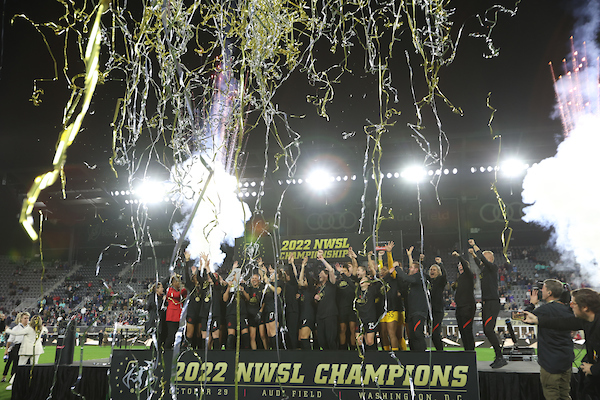
From the moment the first whistle blew, the Thorns dominated the 2022 NWSL Championship game. Despite the fact that this unique group of players had never taken the field together for a final, they looked as though they did so every week. The pressure was high—not only to cap off their successful 2022 campaign with a victory, but also to make a name for themselves as people, not just an agglomeration of players marred by the abuse and scandal in the fabric of their club. The victory cannot erase the history of abuse in the club, nor can it force Merritt Paulson to sell both teams once and for all, but the overwhelming joy the players exude makes you feel that, for a second, it could be possible.
I distinctly remember the end of the 2021 season. It was sad and unceremonious, a home defeat in the playoffs and a silent goodbye to those players. It wasn’t the sendoff they deserved, and it reflected the confusion and fractured nature of the league at the time. This year was an entirely different narrative.
The Thorns had several X-factors when coming to DC that propelled them to a comfortable victory over Kansas City. The first, of course, is Sophia Smith.
In the fourth minute, Smith proved to the world why she was deserving of the league’s MVP title. Capitalizing on the mistake of the KC backline, she took a deft touch around AD Franch and calmly slotted the ball into the open net. It wasn’t arrogance; it was confidence to take on one of the best keepers in the world one-on-one and make her look silly.
To celebrate, Smith just shrugged.
After the game, when asked about her celebration, Smith said, “There’s been a lot of people who think I don’t deserve to win MVP, so that’s a little bit of… that’s that.”
Every day we get to watch Sophia Smith play for the Portland Thorns is incredible. Her talents and composure on the pitch are not to be taken for granted, and watching her play is pure joy. Head coach Rhian Wilkinson put it best when she said that, “Soph is one of the best players this country has produced.” Absolute legend behavior, and she’s only 22.
The league’s youngest MVP and Championship MVP kept the same pressure up the entire game.
“Not every game is that fun,” Smith said, and she was right.
Despite all the trauma in the wake of the Yate’s investigation report, the Thorns seemed to come together to weather the storm. The chemistry between all 27 players who made the trip—a fully healthy roster—was evidence that they leaned on one another during difficult times and really wanted to work for one another. After all, soccer is a team sport.
Wilkinson pointed out that the players had the right to collapse after the release of the report, but they chose not to—largely thanks to the leaders on the team.
The Thorns didn’t collapse. Instead, they flourished. They cruised to a victory and made it look easy. When Christine Sinclair was subbed off to let Crystal Dunn close out the game, the passion as she screamed “let’s go!” was palpable. The players knew how well they were playing, and it allowed them to unlock new heights.
Yazmeen Ryan, in only her second year in the league, showed why she was a starter in the Championship game with her dynamic runs on the right wing. Natalia Kuikka shut down every attack down the right flank. Becky Sauerbrunn and Sam Coffey rarely misplaced a pass down the center of the field. Morgan Weaver’s high press was relentless. Each and every player was having fun, and thus, were playing in ways that showcased their full abilities.
Meghan Klingenberg is the epitome of the Portland Thorns. Since joining the team in 2016, her pregame huddle speeches have become iconic, and her spunk and exuberant personality have helped to bring younger players into the fold. While she doesn’t wear the captain’s armband or receive a lot of press, she silently retains her position as a rock at the core of the Thorns.
Kling’s work ethic and love of the game is infectious, but so is her sadness. Watching her cry as she crossed the podium to receive her medal, knowing the tsunami of off-field events that her and the rest of the team had to endure was emotional. For me, crying is cathartic. It’s a release of so many pent up emotions that I feel I cannot share. Watching and loving the Thorns over the 2022 season has been hard. It’s been hard to reconcile my admiration of the players themselves with my hatred for the front office, and I’m not even directly involved with the FO.
But, I also know how hard it can be to find joy in the things you love when so many external factors are collapsing in on you. During a traumatic experience at my job in Montana, I couldn’t find the energy to watch or care about the Thorns, something that I have relied on as an outlet each week for the past ten years of my life. As cliche as it sounds, moving back to Portland and returning to Providence Park helped me reinvigorate my love for the team. Watching them achieve an incredible milestone, three stars, in such a fun and dominant manner, was incredible. It felt like a rush of relief, that everything the players have been playing for mattered. Kling’s raw emotion felt like a dam bursting; these players have the ability to celebrate this milestone, despite the lack of support from their employers and without those who they have lost over the past year. The players deserve to feel all the emotions—positive and negative—but so do the fans.
The Welcome Home Rally at Portland International Airport on Sunday felt intimate. The players and the fans were connecting on the same level, with no on-field barriers or front office to divide them. The pure joy as Smith lifted Dunn’s baby Marcel in the air, wearing a Championship medal and starting the crowd in a “Marcel” chant was contagious. Players took turns hoisting the trophy in the air, cheering one another on. Shelby Hogan was wearing a space helmet. Everything felt perfect.
Bella Bixby put it best when she said that, “our connection to our supporters was integral. The Riveters have been with us this whole year and stuck by us, and that’s really all we can ask for.”
Riveters, the trophy is for all of us. It’s for the players and the supporters and the coaches. It’s not Merritt Paulson’s trophy. We can celebrate this incredible achievement, and continue to pressure sponsors tomorrow.
The trophy is home. We have our third star. It’s time to keep building a constellation.
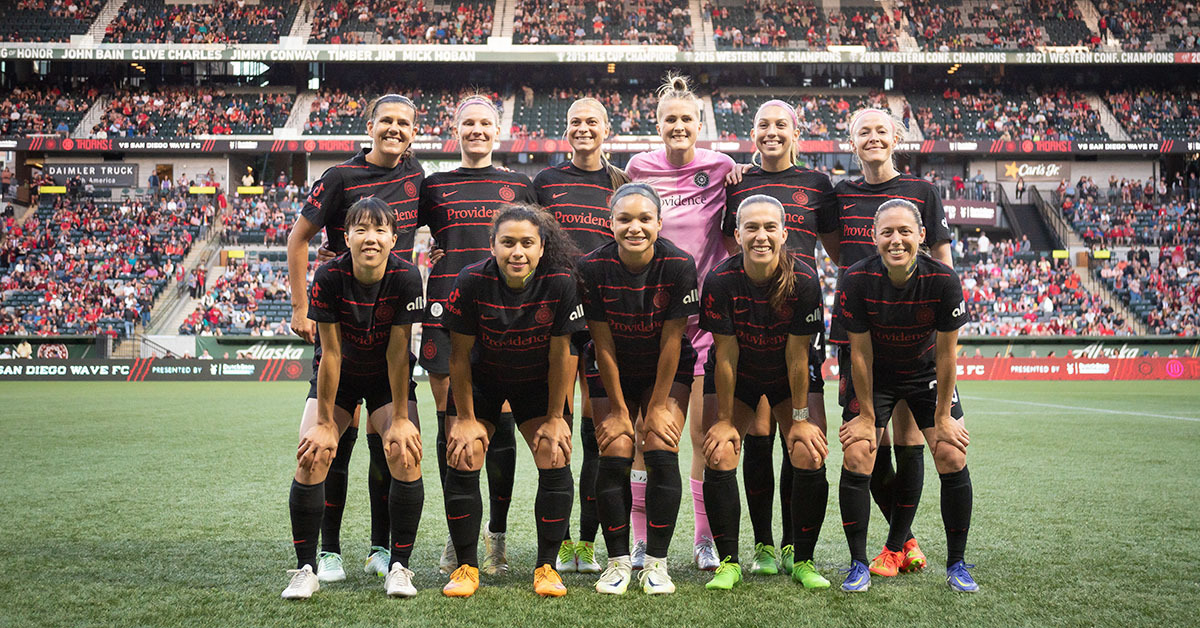
The Thorns are in the semifinals of the NWSL playoffs for a seventh time in their history. They face off against the San Diego Wave, against whom they are 2-2-1 in 2022—between the regular season and Challenge Cup matches. Their most recent meeting was a disappointing Portland 0-2 loss at home in August. San Diego revealed in their quarterfinal game that Taylor Kornieck, who has scored three of the Wave’s six total goals against the Thorns, and Alex Morgan were healthy enough to go the full 90 minutes and into extra time, despite missing out of the USWNT’s European tour the week prior due to injury.
With a bye due to the Thorns’ second-place league finish, the international players have had time to reintegrate with the squad, and the players have had time to decompress and refocus their energy after a frustrating 3-3 draw with last-place Gotham FC to end the regular season. The USWNT internationals had a positive break, despite their two losses, with Sophia Smith scoring a banger in Wembley, Sam Coffey making two more strong appearances, Crystal Dunn getting her first USWNT minutes as a mother, and Becky Sauerbrunn anchoring the backline.
The semi-final will come down to who wants it more. San Diego, an expansion club, have already made history by reaching the playoffs and will want to put a cap on their impressive inaugural season. The Thorns, however, have played nice soccer on the pitch whilst being plagued with the abusive history and culture of their club’s ownership. They will want to win for themselves, to find joy in the sport despite all the difficulty surrounding it.
The Thorns and the Wave are evenly matched. Having Crystal Dunn back in the roster against San Diego for the first time could be the game-changer that pushes the game open in Portland’s favor. Both Morgan and Smith, top two in the Golden Boot race, are still consistently scoring, and each team’s defense will need to do all they can to limit the opposing striker’s time on the ball.
Tactically, it should be a thrilling and fun game to watch at home in Providence Park. But the choice to attend the game has been heavily debated in the weeks since the Yate’s Report dropped on Oct. 3. Since then, Merritt Paulson, Gavin Wilkinson, and Mike Golub, all implicated in the report, have resigned from their positions at the head of both the Timbers and Thorns. The caveat is that Paulson and his family’s company, Peregrine Sports, still own both teams, making him still financially involved despite his public resignation. This is the holdup that many fans are divided on.
I want to make my position clear, which is that it is necessary for Paulson and Peregrine Sports to sell both teams. So long as he collects a paycheck from PTFC, the players are not truly free to speak their minds and feel safe within the organization. Everyone deserves to feel safe and respected within their job, and so long as someone who covered up abuse is at the head, that culture can simply not exist. Much like the art cannot be separated from the artist, the NWSL and its club cannot be fully separated from their abuses until they are burned down and restructured.
At the same time, I am allowed to state that opinion because I am not employed by the Thorns. I do not owe Merritt or any other management anything, and I have no fear of being reprimanded, fired, or abused for stating my opinion. The vast majority of the players who are in the middle of the abuse do not have that luxury.
When reporters repeatedly ask players and head coaches to speak out on the abuse that is occurring within their organization, the players often do not have the ability to speak freely on these issues. Their job, housing, and lives depend on being employed by these clubs. And with Paulson, someone with a reputation for retaliation, still at the helm, the players must protect themselves first.
Sauerbrunn, in a media appearance for the USWNT stated, “It’s my opinion that every owner and executive and U.S. Soccer official who has repeatedly failed the players and failed to protect the players, who have hidden behind legalities and have not participated in these investigations, should be gone.”
Sauerbrunn, beloved USWNT Captain and stalwart of the league, has an innate level of protection that other players do not have. It’s unlikely that Sauerbrunn will be removed from the roster of either team she plays for because she has spoken out. Dunn and Smith, on the other hand, do not. Dunn, just returning from maternity leave, does not have a solidified spot in rosters. We’ve seen USSF cut players like Megan Rapinoe and Christen Press from rosters due to them speaking out, and it would be easier to do on a player just returning from an absence. Smith, despite all her talent, is still barely 22 years old. Her career is just starting. She can’t jeopardize that by rebelling against her employer.
At open practice on Oct. 21, two days out from their important semi-final match, Sauerbrunn, Dunn, and Smith were all asked questions relating to the Yates Report and Thorns’ ownership. Sauerbrunn had set a precedent by speaking her dissent of Paulson owning both teams, and fans and media now expect all players to be able to be this free with their words and form a concrete opinion.
All three players spoke about how they wanted fans to be there for them, cheering in the stands to support the players. They dodged questions about ownership and a sale of the team, which in one light can read as though they are in support of Paulson and his ownership. Silence is often associated with complacency and complicity, but when you’re asking an employee about their employer, this is no longer the case. I admit that myself, as a fan, want the players to speak out about Paulson and Peregrine Sports, but I need to stop putting that pressure on players.
It is unacceptable to expect a player to comment on their employers without fear of retribution.
There are rookies, players with just one or two years in the league, practice players, on field staff and trainers, all of whom don’t have much of a voice in the league. Using their voice could cause them to end up without a job, or without a support structure.
The best result from the semifinal game will be the Thorns playing freely and with passion. Aside from a win, of course.
It’s up to the fans individually if they want to show up in person at Providence Park on Sunday and cheer for the Thorns. It’s unacceptable that Paulson is still profiting off of the players and fans right now. But, the players still have to play. The season isn’t over yet. What media and fans can do now is stop expecting answers out of players. Direct this energy towards sponsors, upper management, and the like. They’re the ones who have the power to make change. Demand it of them.
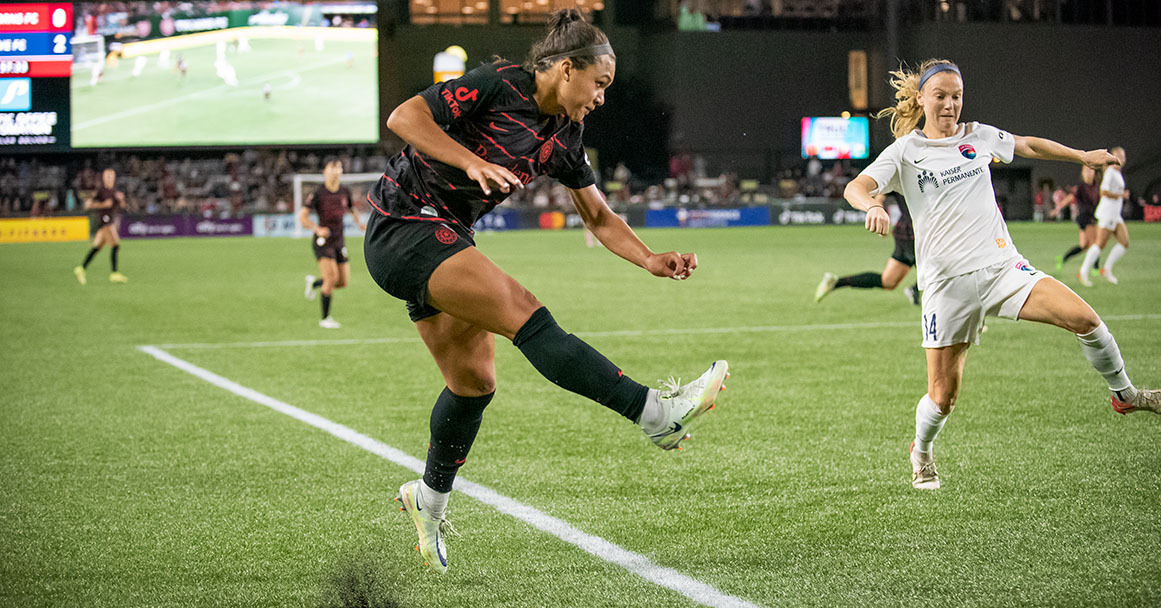
Sophia Smith is a menace for defenders both on the club and international level. Her footwork and finesse on the ball make her incredibly difficult to mark as she spins her way towards the goal, and defenders have caught on that one of the only ways to stop her is to foul her.
Smith tweeted earlier this week that she needed to “practice how to shoot the ball when both legs get completely taken out from under me” in reference to a clip of a foul from Portland’s game against Kansas City on Sept. 18. The tackle, which came from behind when Smith was in on goal, one-versus-one with the KC keeper, was not called as a foul.
today at training I will be practicing how to shoot the ball when both legs get completely taken out from under me https://t.co/h7m4GTgJOb
— Sophia Smith (@sophsssmith) September 20, 2022
She followed up her statement with a clip from a college game at Stanford, where she broke her leg during a nearly identical tackle from the opposition.
fouls like this are exactly how I broke my leg in college, that’s why they can’t go unnoticed. alright thanks for coming to my Ted Talk bye https://t.co/NnAeYMsY5Z pic.twitter.com/xxQMp8rgWe
— Sophia Smith (@sophsssmith) September 20, 2022
Forwards are meant to be brave as they drive the ball toward the goal, and Smith certainly is. But when dangerous plays aren’t called, it incentives the defense to continue making reckless challenges, and leaves the forward hurt, even sidelining them for months like Smith was during college. Referees are on the pitch in order to protect players, and refusing to do so is willful neglect.
Post-game on Wednesday night, Smith said that being repeatedly fouled is “frustrating for sure… But if I let it get to me, then it will affect how I play. So I try to not think about it too much going into games and just accept the fact that I’ll probably be getting fouled left and right.”
Players should not be forced to have this type of mindset while playing professionally. They should not be resigned to the fact that they are going to be repeatedly fouled and potentially incur a season-ending-injury. They should feel both physically and mentally safe when they walk onto the field. Until referees start calling dangerous and repeatedly plays on players like Smith, the number of fouls and injuries will only increase exponentially.
The Thorns’ two previous games against the Kansas City Current and Racing Louisville were both physical. The Current committed 10 fouls that were called, while Racing Louisville committed 12. However, the crucial element here is the number of fouls that are not called. Per Statsbomb, Smith has been fouled 38 times, 12more times than the next highest player, Hina Sugita.
However, in each game against the Current and Racing Louisville, Sophia Smith only won one foul.
Here is a list of all the challenges where Sophia Smith was brought down:
16′: Sophia Smith is double teamed at the top of the box. As she turns towards goal, Claire Lavogez comes in as the third defender on Smith and sticks her leg out, tripping Smith. The ball goes out of play for a goal kick.
45+3′: Adrianna Franch comes off her line and collides with Smith as they both go for the ball. Both receive medical attention and the ball comes in on a goal kick.
48′: Smith is played a ball over top of the defenders and runs onto it, getting there first. She takes a few touches, then once she is in the box is tackled from behind by Addisyn Merrick. No foul called.
60′: Smith receives a ball with her back to goal. She makes the turn inside, and Merrick sticks her foot out late. Foul called for Smith.
86′: Smith is double teamed. One player boxes her out while the other swipes at her feet and she goes down at the top of the box. No foul called.
45+1′: Gemma Bonner was already between Smith and the goal when Bonner stuck her leg out, causing Smith to fall to the ground. There was an immediate whistle called.
45+2′: Smith and Satara Murray both go after the ball, as it’s loose around the top of the box. Smith hip checks Murray, and Murray falls on top of Smith. The whistle is immediately blown against Smith.
54′: Smith is dribbling towards goal on a threaded pass by Natalia Kuikka. Bonner swipes at Smith’s legs from the inside, doesn’t connect with the ball, and brings Smith to the ground. No whistle is blown.
71′: Smith is subbed out.
These are only the stats of two games, and Smith is only one person. While the data alone cannot identify a trend, when set alongside the rest of the season, they tell a more complete story. Smith has only scored once in her last five games in a Thorns jersey, compared to two in her previous two for the USWNT. Coupled with the seeming endemic of SEI and ACL tears among NWSL players, a trend emerges indicating that players are in more danger of serious injury. With referees not calling these tackles, they will only increase, thus increasing the number of season ending injuries as well.
The players need to be protected; it’s as simple as that. With the signing of a historic CBA, players have finally had their rights recognized, but this recognition must extend to the pitch. The first step is making sure that the referees are trained and able to call all hard tackles. If not, the risks will only escalate, and players like Sophia Smith could leave the NWSL for their own safety.
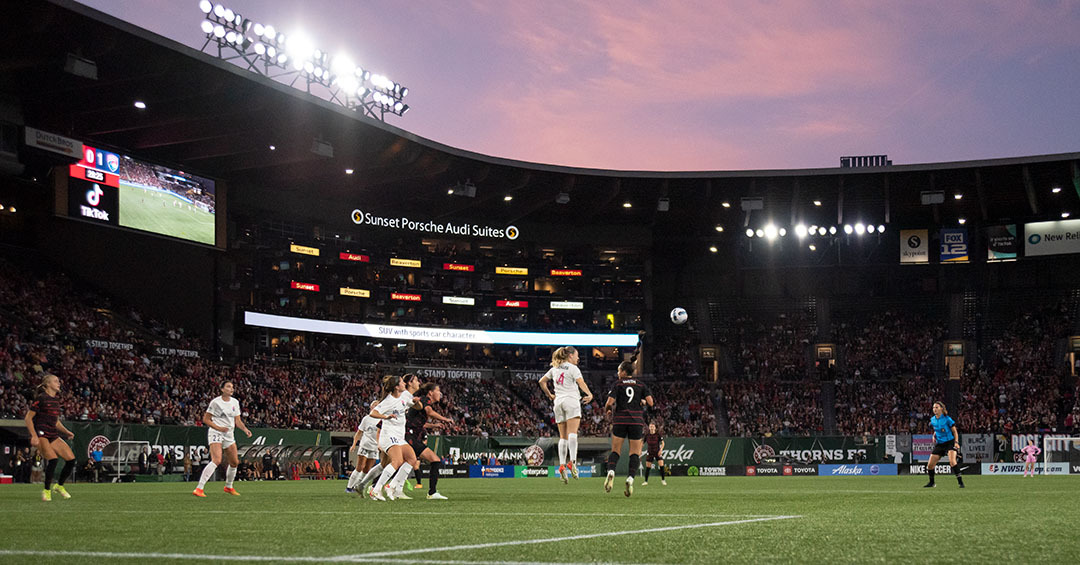
The Thorns recorded their second straight loss against the San Diego Wave at home on Saturday evening. Coming into the home match, the Thorns were averaging over four goals a game in Providence, yet have scored only one goal over the last two matches while conceding five. After spending several weeks sitting alone at the top of the table, the Thorns have fallen to fourth place with just five games left to clinch a playoff position. Dropping more points could put them in danger of making a postseason run.
While it is nearly impossible to identify just one thing that went wrong, let’s take a look at several factors that could have contributed to the Thorns’ downward trend.
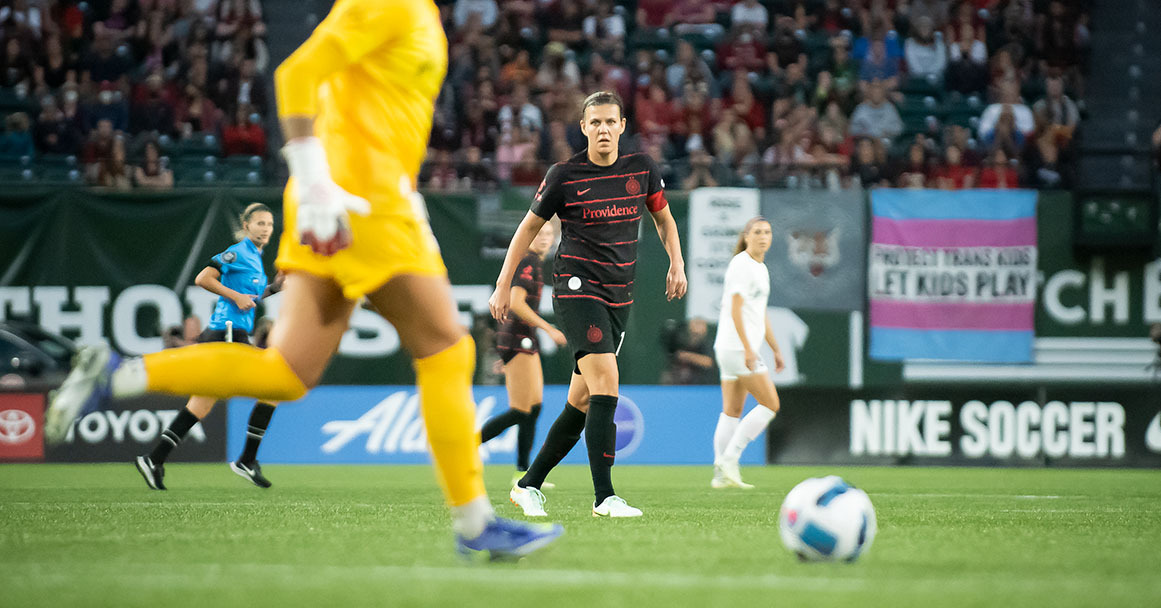
Too few subs, too late
In a move unlike ones we have seen previously from head coach Rhian Wilkinson, she waited until the 80th minute to make any changes to the Thorns’ formation. In a must-win game to remain at the top of the table, the Thorns started the strongest eleven players they had in a 4-3-3.
Both Sophia Smith and Morgan Weaver started, when usually Wilkinson starts one or the other, with the second player ready to come off the bench and make an impact with their fresh legs on a tired defense. With both Weaver and Smith on the field, Wilkinson was left with few options of a different style of attacking player when neither of her starters were able to produce. Smith regularly had two or three defenders surrounding her touch-tight, making it hard for her to complete her signature spin-and-dribble-out-of-pressure. Weaver is known for her infinite engine and power for the entire 90 minutes. Against the Wave she had the only two shots on target, and delivered four crosses. She was the most dangerous attacker, but wasn’t able to connect her crosses with the players making runs into the box, oftentimes seeing the ball frustratingly roll across the entire box only for a Wave player to clear it on the opposite touch line.
Both forwards played all 90 minutes of Saturday’s game, and while in theory Wilkinson starting her two top producers gives the Thorns the best chance of netting goals, when it doesn’t work out, there are no backup options. Ideally, a player like Yazmeen Ryan would start in one of those wide forward spots in order to provide service, and if she isn’t connecting with either Smith or Weaver, then there is an opportunity for a change to be made and for a different perspective to attack the opposing defense.

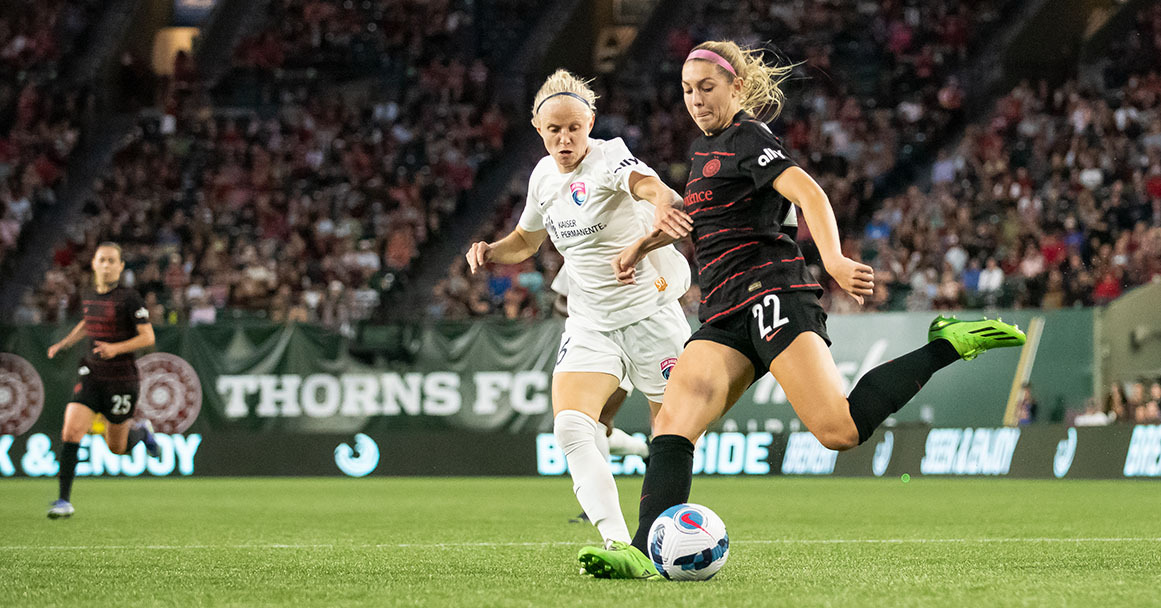
Janine Beckie and Yazmeen Ryan got eleven minutes each, both of whom were attacking-minded substitutions. When they made their appearance, the Thorns shifted to a three-back, pushing Beckie up along the right side in front of Kuikka. In her short cameo, she created one chance, which tied her with the second most for the Thorns. Ryan applied similar pressure from the moment she appeared on the pitch, making several dangerous dribbles into the box, but was unable to get her shot off.
Olivia Moultrie, Portland’s third and final sub, only got three minutes. In an interesting and previously unseen formation move, Sam Coffey slid back to play the third defender as Wilkinson made another attacking substitution. Although Moultrie only got two touches, her change showed that the Thorns were capable of changing their formation and structure of attack mid-game.
Time can’t turn back, and the Thorns will never get those three dropped points, the game against San Diego begs the question of what could have happened if these changes had been made sooner. For eighty minutes the Thorns tried to score using the same tactics, namely feeding balls to Smith and expecting individual brilliance. However, once it became clear that Naomi Girma and the rest of the Wave’s backline was too strong to penetrate this way, a different tactic needed to be implemented, and a change in personnel was the obvious way to do this.
Defensive Lapses
Simply put, the Thorns’ defense was not organized enough to effectively stop San Diego’s attack. Post-game, Becky Sauerbrunn commented on where she thought the game was lost for the Thorns.
“A lot of credit to San Diego. I think they’re very good at what they do, and even though we knew what they were going to do, they still got that second goal on us. It’s tough to win games when you’re letting goals in,” said Sauerbruun, finishing that she thought the Thorns’ heads remained high despite the loss.
The Wave’s first goal was allowed because they were able to have an unmarked player at the top of the box. A missed clearance by Kuikka allows the ball to be picked off by the Wave and passed back to McNabb making an open run at the top of the eighteen. Rocky Rodriguez makes a last-ditch effort to close her down, but was ultimately too far away and too late to prevent the shot from going off.
Both Morgan Weaver and Sauerbruun mentioned post-game that the Wave’s plan was to flick the ball off of Taylor Korniek’s head onto Alex Morgan, and that is exactly how the second goal came about. While it is hard for any player to match Korniek’s aerial abilities and height, it is possible to shut down the second pass to Morgan and prevent her from running at goal with no defenders.
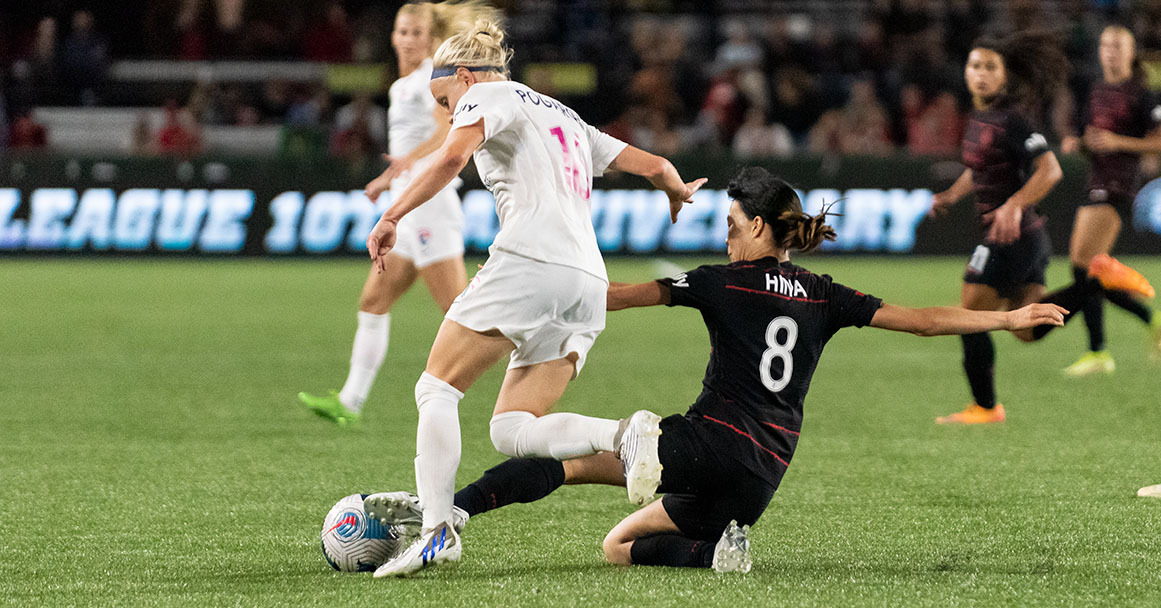
While it is hard to be consistent for an entire ninety minutes, small changes and closer marking from Thorns players could have changed the outcome of the game, not allowing open players in their own box.